#I wanted this to read like an actual tv show - hence the change in narratives. speed. scenes. etc...
Explore tagged Tumblr posts
Text




























RICH ROMANCE || A BACHELOR CHALLENGE
EP 1. - PART 1
As the contestants enter the "villa" - more like a sumptuous gothic manor - the mingling begins. Will they become friends, or ruthless enemies? Who shall make the first good impression on Mr. Galvus? And most importantly, who. is. Kermit le froge?
Contestants by: @thebramblewood @plasmafruittree @havenroyals @riverofjazzsims @moonfromearth @plasmafruittree @invisiblequeen @bloomingkyras
Avery: (narrating) As we arrived to the manor, those of us who didn't have black clothes were offered new outfits. So we'd all match, I guess.
Avery: Needless to say, I am not sure how to feel about it.
___
Narrator: As the contestants change into their new outfits, Euphoria wastes no time getting to the bar in the dining room.
Narrator: And it quickly turns into a welcome party for the contestants.
Emet S. Galvus: It's not that I was too nervous to meet them at the door. I simply wished to observe them mingle before making my presence known.
Avery: (Narrating) That girl, Danae ...
Avery: (Narrating) I think she might be a vampire.
___
Matias: (Narrating) I was impressed when I saw the manor. But somehow, I was even more impressed by the balls of that girl who just took a shower right behind me. In public.
Visha: (Narrating) I don't want to talk about it.
Narrator: But not everything is going smoothly. In fact, tensions already begin to rise on day 0 ...
Annika: (Narrating) I'm not worried about Visha. From what I know of Mr. Galvus, he wouldn't want a woman who showers outside anywhere near his granddaughter. She stands no chance.
Annika: (Narrating) The one I'm really worried about is Danae. She is beautiful, and from what I've hard, dangerous. She might have an advantage here.
___
(Wine pouring noises)
Avery: (Narrating) I found myself getting along with that other girl, London, I believe. She's quite nice, and an artist like me.
Avery: (Narrating) I felt bad for her, about her grandmother. I but I can't let that sway me - this is my chance at finding true love, I can't squander it!
___
Narrator: And then, London goes for it, approaching the bachelor with wine in hand.
Emet S. Galvus: (Narrating) Unlike the common misconception, the death of grandparents doesn't really get me in the mood for much of anything, unfortunately. I had to give my condolences, of course, but ... not a great opener.
___
Euphoria: (Narrating) Not quite sure how I became the bartender for everyone, but once that was done, I was quick to grab my own drink.
Euphoria: (Narrating) I stayed a bit and chatted with Avery, cause I felt bad after London seemingly ditched her to go talk to the bachelor.
Euphoria: (Narrating) But then I ditched her too after she started texting while talking to me.
Narrator: Production confiscated her phone after that.
Narrator: And after Matias tried to impress the table with his impression of "Kermit le froge", the party was pretty much over, everyone dispersing across the manor.
#rich romance bachelor challenge#rich romance bachelor gameplay#ts4#simblr#ts4 gameplay#Any jokes are in good faith!#I must also disclose that I'm letting the sims play themselves a bit#So no Visha showering naked outside was NOT my doing 😭#I hope it's not too disorienting#I wanted this to read like an actual tv show - hence the change in narratives. speed. scenes. etc...#sims 4#ts4 screenshots#s4
34 notes
·
View notes
Text
Why the Pacing in Castlevania feels slow - but actually isn't

Okay, based on my long, long write up from yesterday, where I went into the theory of pacing narrative media, I want to talk quickly about one thing. Because I love Castlevania, and I think - outside of season 4 - the pacing in this show is pretty spot on. Mind you, the pacing in Nocturne is a bit better than in the original show, however, the reason that a lot of people feel that Nocturne is much faster paced than the original four seasons.
But the reason why people have this feeling is... actually kinda funny.
It is the editing. I say it right now: Castlevania is edited in a way that is untypical of how visual media is edited. And to this day, I am not fully certain who made the call. Was it Warren Ellis or was it one of the directors? I am not sure. I am assuming it was Ellis, given that the directors are the same in Nocturne - and the editing is very different in Nocturne - but that is just me assuming things.
So, what do I mean by this?
It is fairly easy: Usually TV shows have episodes with an A plot and a B plot. At times there is a C-plot too. And those two plots are interspliced. Meaning, you usually get a scene in A, then a scene in B, back to A, back to B, then maybe a bit of C, then back to A, then B, C again, A, B... You get the idea. This is usually something that is still around because it was needed in more episodic storytelling, but even in serial storytelling these days the idea remains. And as such, the creators try to engage the audience a bit more, by switching between the different plotlines. There is more change, hence the pacing subjectively feels faster.
Castlevania does not do this. Castlevania goes about the different plotlines more in the way a book is going to do. Basically, a large chunk of plotline A will play out, and then a large chunk of plotline B. If there is a third bit for the episode, then also a large chunk of this.
So, in each episode of Castlevania, it usually goes like this: We first spend about 8-10 minutes with one or two characters. And then 8-10 minutes with one or two other characters. And eventually at some point maybe 4-6 minuets with someone else.
The one episode that does this differently is season 3 episode 9. Yes, the rape episode. Where the intersplicing of the scenes clearly tries to communicate something - which is a lot more clearer here, of course, because the show normally does not do this.
When we go into actual analysis however, Castlevania covers about as many plot beats as most other streaming series do, per episode. It just feels slower, as it feels as if the scenes last longer - just because we linger with the characters. Mind you, if you ask me, the pacing is actually still too fast, because of streaming. As I said before: Ye olden days, when shows got 25 episodes per season were better. In a nice world, what we got as Castlevania, would have gotten at least like 50-55 episodes, with some good old fillers in there, that would allow us just to get to know the characters a bit more.
There is just two issues here.
For once... I do not know how else to put this, but: Yeah, people are tiktok brained too much these days. Basically a lot of folks feel bored with an episode lingering with one thing for almost 10 minutes.
And also... look, streaming and the "binging model" has really, really messed with how people consume media and how they expect pacing to go. Because in general pacing these days is too fast. And because of this, the audience is given way less chance to linger with the characters. And that is not a good thing.
And yeah, I will admit, this is topic that starts to annoy me. My two favorite movies from last year (outside of Wicked) were Heretic and Conclave, both of which I watched in December. And reading through the reviews of both movies, I saw so many people complaining about how supposedly slow the pacing in either movie was.
And... Okay, I will openly admit: The first half of Heretic is slow. Like, it about 40 minutes of people just talking around a table, before the "horror" aspect of the movie starts. However, I will argue this works very well, because it builds up properly.
And meanwhile Conclave? Frankly, this was one of the fastest paced movies I saw last year. Just there was no action. But the plot? The plot was in constant movement. Like, there was an important plot development literally every few minutes for the entire two hours. It is just, that of course most of this happens through "people talking".
But guess what: In a lot of media "people talking" will move the plot forward. Not everything needs to be action with fast editing.
To come back to Castlevania: The one season I will argue was not ideally paced is season 4. Because it is fairly clear that Ellis at least hoped to have a few more episodes. I talked before about how neither Sypha, nor Hector properly get to finish out their respective character arcs. Sypha's arc is set up in season 3, and then just gets abandoned in season 4. And Hector's arc mainly plays out off screen. We never get to see him going from: "I am miserable and I was used and abused" to "Okay, I need to do something about this". We get the information that his happened at some point in the 6 week time skip between the ending of season 3 and the beginning of season 4. But we never get shown it. Same with Carmilla's descent into madness and how exactly Striga and Morana got to the point they are in episode 4. Other than that, season 4 is not particularly rushed. Basically it is just that the time skip skips about stuff, that would have been nice to have. But then within season 4? The pacing is fairly okay. Not quite as well as especially season 2 and 3 (mostly because it is fairly uneven), but pretty alright.
But overall? Castlevania is fairly well-paced. Just in terms of how many plot and character beats happening per episode. It is just presented in a way, how you would normally present the story in a book or maybe even a comic - rather than in the way that is way more common for visual media. And because of it, it feels slower.
And in the end I will say one thing: As an autistic person, I actually gotta say, I do prefer the way those four seasons present the story - with the long chunks, rather than interspliced. It gives my autistic brain a lot more time to focus and get into each scenario we get per episode, rather than having to switch back and forth between different scenarios.
Ironically it does remind me a lot of early 2000s Japanese horror media (including anime), that often was edited in a similar way. Though I do have no idea if this was somehow intended or not. But in general the pacing does remind me a lot of Ayakashi, Mononoke and their peers.
#castlevania#castlevania netflix#pacing#writing#writing advice#media criticism#tiktok brain#streaming#streaming kills media#fuck streaming services#fuck binging
22 notes
·
View notes
Note
Hello there lovely human 💛
I’m kind of going around my favorite writers and ask them for advice and insights about their process (so I can collect it all like a hoarder). I hope you mind sharing some wisdom with us 🥺
So what I just don't understand is how you can post as you write while maintaining this level of awesomeness in your writing. Without writing yourself into a corner and keeping consistency. And it is awesome, the first time I read "You and me, we got a big reputation" I stayed up till 4 in the morning to finish it and it left me full of emotion and hollow at the same time (the same way as when you finish a great TV show or a good book or an awesome video game leaves you feeling, like something beautiful just ended and you can never experience it again. The kind of hollow that leaves you wondering what to do with your life now, that your world has changed, where your chest is empty and full at same time).
Anyway, how do you approach your ideas? Do you have the whole fic plotted out before sitting down for the first chapter? Do you write in order? Does it always go the way you plotted it in the beginning? How long did it take you to plot out "Where you go I go"? Or "You and me, we got a big reputation"?
Anything you want to share about your process would be appreciated 💛
I'm trying to put into words my first actually long fic ever and I know it will be better if I post it after it is all finished, but it is also easier to keep up the momentum if you have readers on your side.
hi!!!
firstly, thank you for the love on big reputations. I'm coming up on a year since I posted the first one shot in the don't blame me series, and I'm feeling some type of way about that.
secondly ... man oh man. I'm gonna go question by question here, but I'm gonna put it below the cut because I know I'm gonna ramble.
well the first thing is that I'm not posting as a write, not really. I'm three chapters ahead, which for me is what I need to make sure I don't write myself into a corner. I'm far enough ahead that I can keep control of the narrative. some people like be further ahead, others don't need to be ahead at all, but that's about the appropriate distance for me, I've found.
it depends on the fic! wygig is pretty much entirely plotted out, yeah. big reputations was not. I had a general idea about where it started, how it was ending, and what I wanted to happen in the middle, but specific scenes weren't planned - not like wygig. GMTF I had specific scenes in my head that I wanted to write, but more I had specific emotions I was trying to capture, and I built the plot around that. in my original manuscript, I had the three acts planned out, the main plot points per act, and then felt it out as I went (which ended up meaning I had a serious pacing problem that is still unresolved, hence why it's still sitting in my drafts lmao). so yeah, it depends on the story.
I write in order these days, but I didn't used to. I've just found that, for me, writing in order means that it forces me to keep writing, because I HAVE to go through all the boring scenes to get to the fun scenes. I use it as motivation, but that doesn't work for everyone! it certainly means that sometimes, by the time I get to the fun scene, I've forgotten what I had planned for it, so I have to build it all up again lmao.
no it doesn't always go the way I plotted! characters often do things I hadn't planned for them to do - sometimes good, sometimes bad. I've been going very rogue recently with wygig, as @saiyanwitcher can attest to. she's had to reel me back in quite a lot recently haha.
oh god, it took @saiyanwitcher and I probably .. I'd say we worked on plotting wygig for a solid month before I started writing - BUT the major caveat here is that I was writing the brocedes fic while we were plotting it out. so I refused to start writing wygig until I finished that, which meant we spent more time on plotting than I usually would. and then we revisit plot points as I get closer to writing them - see what can be kept, what needs to be deleted, what needs to be changed to fit the rogue elements I've inevitably introduced lmao
as I said, I didn't really plot big reputations out like I did with wygig, so that didn't really take any time at all! haha
as advice for putting together your first long fic ... what I'll say is this. I've been writing for almost 15 years at this point. I didn't even realise that I was coming up with a way to write that works best for me until I'd already done it.
I realised I needed people to give feedback as I go. I need to have written a lot in advance, before I start posting anything, so that I know I can finish it under my own steam and that my interest will continue. I need to listen to my mind when I get bored, and take a few days break from writing - but I can't go more than a week without touching a fic, otherwise I won't go back.
they're all things you'll learn along the way!
I also think you should try not to compare yourself to others. if you try to match what other people are doing, you'll never finish, because you'll end up disappointed in one way or another. it's easier said than done, for sure, but if it's your first, give yourself some slack and take everything as a learning experience!
and remember, above all else, to write for yourself. if your always writing for yourself, writing what YOU want to see, the motivation is easier to find.
13 notes
·
View notes
Note
This likely isn’t what you were looking for when you asked for character recs, but I’ve seen only really modern versions of DC characters shown in the DPXDC community. Rarely does anyone touch on the golden or silver ages of comics!
A character’s main philosophy doesn’t change that much from its modern counterpart but often how they interact with the world absolutely does. Especially this applies to comics of the Silver Age era due to the Comics Code Authority restricting and heavily censoring Anything they deemed unfit in the comics of the era. The idea of shoving a character not from the silver ages into it and feeling their very being altered and actions betray them due to having to follow the rules of the Comics Code Authority and the narrative troupes of the era is an idea I’ve toyed with for soso long. Or at least even use the characterizations of old in general.
Just using silver ages rn bc I don’t want this post to get too long but In the earlier silver ages comics were fairly high camp. Stories may have an arc but are more likely to set up and finish a story within the same comic issue.
Due to the rules of the CCA:
- villains literally cannot win or be sympathetic At All.
- Cops can’t be portrayed in a bad light.
- No foul language.
- Homosexuality is banned (which, if you put a queer character in. You could go all sorts of psychological or body horror with that. Having them being literally slowly erased from the story or via another method.)
- People can’t use weapons with real world equivalents to prevent the idea that kids should play with them. (hence the amount of bombs, rays, contraptions, etc that exist in the silver ages. Also contributed to TV censorship and hence why Danny Phantom doesn’t have a lot of actual guns shown in the show but instead ghost contraptions that look like guns.)
- Characters cannot die onscreen
- and so much more,
Think Batman 66 levels of camp & heavy level of censorship. Like, the directors trying to medically castrate Burt Ward, the actor who played Robin. Because he had such a honking schlong that the Catholic League of Decency thought his “well-endowed” bulge that showed through the tight shorts Burt wore as apart of his Robin costume was too scandalous for TV. And for whatever reason, medical castration was the studios first choice of action instead of just filming from the waist-up and using his cape to cover his front when necessary. Which was their second solution only after Burt Ward refused to take the pills the studio prescribed to him. That’s the type of heavy censorship I’m talking about. Everything must be child friendly and if it’s not, the CCA and censorship committed would enforce radical changes to the script, costume, drawing, etc to make it fit their idea of purity.
The silver ages are old enough that it is likely your local library has big ol omnibuses of a run of these comics, although it’ll likely be a run from a member of the main JL crew.
That and the 50-80+ year compilation books also provide commentary and background info so they’d also be an amazing resource in this case!
Here’s some additional links to resources if you’re ever interested in the concept:
- In the “Read The Comics” section on the menu of this lovely blog, there’s so many silver age Superman comic scans you can read entirely for free! It’s genuinely an amazing resource for Superman. The site also has amazing comic recs and I’d highly recommend checking it out.
- Captainmarvelology on Quora. They have so, so many fantastic essays on golden age Captain Marvel and is the person who introduced me to Shazam! Here’s one of my favorite essays they did!
Seriously though? take an hour or two to read through their blog. It will genuinely completely change your understanding of the character. It’s so good. And the posts will sometimes go into how the political and social landscape of the time directly influenced the comics!!!! I love that shit!
- An amazing blog dedicated to Golden Age Captain Marvel. Lots of fun essays and history lessons with a side of comic reviews:
- A fantastic blog that has both quick and lengthy explanations of the backstories of The Flashes! Has more of the Flash Family and is a more through and complete resource than the one above. The page I linked is to the series history, where the blog explains the evolution in how characters were treated & how the comic book industry changed its views on these characters as the series progresses! Resource for Golden Age to Modern Age of comics for the flashes if you want to know more about the dudes!
- Chris Sims’ blog. A comic writer who makes lovely analysis and critical essays on Batman and other comic media and semi-frequently writes reviews on silver age Batman comics!
- Reviews of random issues of silver age Superman’s Pal Jimmy Olsen comics! (The blog is also run by Tony Isabella, a comic writer who created Black Lightning, Misty Knight and Tigra. There’s so much more fun stuff on his blog. Id highly recommend scrolling through and picking whatever post captures your eye) Jimmy is one of my favorites sidekicks of all time. He’s brace and loyal beyond fault, he’s extremely stubborn and down to cause issues he’ll inevitably have to deal with later at the drop of a hat. Chaos follows him and it’s so damn entertaining to read.
- A forum about anything and everything comic. There’s a silver age & golden age section as well’ A wealth of information and takes on the characters by different people. A great way to scout out how other people envision the character and formulate your own while reading the analysis and thoughts of other people!
And, I cannot heavily recommend these podcasts enough for beginner & current comic readers:
geek history lesson. It is what the name suggests! Wonderful recapping of DC characters with lots of research going into them and their history.
Character Corner, an amazing podcast. They also have a YouTube channel. And they have The Best insightful commentary with hosts that understand the fundamentals of the characters very well. Gives amazing comic recs also btw.
Both have issues discussing the Golden Age & Silver Age for many characters and they dive into more in-depth & involve discussions of how the historical context around the characters at the time shaped how comics and characters were written!
I’d recommend first listening to an ep of a character on geek history lesson then next listen to the character corner episode on the same character as they involve additional discussions of characterization & first knowing their history helps a bunch.
What suggestions would you have for cool, lesser known DC characters I could write a crossover fic with.
Preferably not Gotham-based characters because as much as I love them I need a break and I want to try something new. I know you mentioned Animal Man in another post. Does he have a solo run I can look up or is he usually in group comics/a side character in somebody else’s comics?
(I am deliberately baiting you to info-dump to me about any DC characters you want and I will write a fic with them so go nuts.)
Sadly at this current moment I can’t infodump nearly as much as I’d want to because my carpal tunnel is being a lil bitch but I can give synopses:
Animal Man- Buddy Baker, a typical suburban dad who also happens to be a hero that can use abilities based on any nearby animal (including bacteria?). He is powered by The Red which is the animal version of The Green (Plant Life). The Red is less the concept of all animals but more the concept that all animals are meat. his comics are either a beautifully terrifying body horror gore fest or a 4th wall breaking mind bending creation. No in between. Having Animal Man fight the Lunch Lady and realize she’s fundamentally a different being and not of The Red would be crazy awesome.
Booster Gold or Ted Kord: Booster Gold is a Time Cop who got his job from stealing shit from the Hall of Justice Museum and heading to the Age of Heroes to fund enough money and fame to pay for his mothers cancer treatment. He could be used in Clockwork related fics a lot and he’s also equally as much as a dumbass as Danny.
Blue Beetle also known as Ted Kord, is basically in the same package deal as Booster. Ted Kord, Late owner of Kord Industries, ja a brilliant master of technology and has stuff from a massive beetle ship to a gun. He’s best friends with Booster and their bromance could be fun if you want Danny to have two partially functional adult mentors.
Wally West. The second and fastest flash. A he’s the most go with the flow dude I’ve seen in recent comics, including dealing with an inter dimensional WWE esque fight where he fights alongside Space Hulk Hogan, and has a wonderful Wife, Linda West, and (sometimes) twin kiddos. The Flash’s entire sthick is family. They’re more family centered than the Fast and Furious movies for god sake. Having Danny find a new home in any speedsters home would be incredible.
The Spectre: the embodiment of Gods Wrath. I would go on far too long of a rant remind me to do one later but for now all I’m saying is that it would be sick as fuck for The Spectre to kill Vlad for the horrible things he’s done.
Green Arrow or in general Star City: Oliver Queen, inheritor of Queen Industries is a dude who got trauma after a boat sank and some island thing (tbh I don’t know his backstory off the top of my head), but he’s a very quippy and hilarious guy who’s jokes would mesh pretty nicely with Danny’s humor and in general he’s underutilized in both dpxdc and DC so it’d be nice to see that change :)
Ok hands are getting angry but I hope that’s a fun starting example list for ya!! :D
269 notes
·
View notes
Text
Media Market Research (and why its undermining all the things you love)
Trying to understand what is dysfunctional about Hollywood is an epic task, and the answers are like the stars – arguably infinite. Hollywood is dysfunctional for literally more reasons than I could count.
But market research plays a fairly heavy role in its dysfunction (IMO) and the time has finally come for me to add my professional two cents about this issue. (This rant of mine has been building for a while, FYI. Hence why it is so...comprehensive. There is a tl;dr section towards the bottom, if you want the high level summary)
*** For the last 4+ years I’ve worked in the field of market research, almost exclusively with major media makers like Warner Bros., NBCU, AMC/BBCA, Viacom, FOX (before Disney acquired them), A+E, etc. (this past year I quit the job where I was doing this work for a variety of reasons, many of which will become clear as you keep reading, but I am still listed as a consultant on the company website): https://www.kresnickaresearch.com/who/ (Rachel)
And just for comparison, here is a Halloween selfie I took 4 years ago and posted on my blog, so you can see I am who I say I am.
I know a fair amount about how market research on major media franchises is conducted and how it influences production, and a lot of these choices can also be at least somewhat tied back to the massive flaws in the market research industry and its impact. *** First, at the highest level, you need to understand market research in general is not well-conducted much of the time. Even the people doing a reasonably good job at it are VERY limited in doing it well because of financial constraints (clients don’t want to spend more than they have to), time constraints (clients want everything done as fast as humanely possible) and just the inherent problems within the industry that are decades old and difficult to fix. For example, all market research ‘screens’ participants to make sure they qualify to participate (whether it is a mass survey, a focus group, a one-on-one interview, etc.). So, we screen people based on demographics like race, gender, age, household income, to get representative samples. But people are also screened based on their consumption habits. You don’t want to bring someone into a focus group about reality TV if they don’t watch reality TV. They aren’t going to have anything useful to say.
However, a lot of the people who participate in market research have made a ‘side-gig’ out of it and they know how to finesse the process. Basically, they’ve learned how to lie to get into studies that they aren’t a good match for because most market research is paid, and they want the money. So, a lot of TV and film market research is being done on people who don’t actually (or at least don’t regularly) watch those shows or movies or whatever but have learned how to lie well enough in these screening processes to make it through. And because of the aforementioned time and money issue, clients don’t want to spend the time or money to actually find GOOD participants. They just accept that as an inevitable part of the market research process and decide not to let it bother them too much. So, a fair number of the people representing YOU as a media consumer are people who may not be watching Supernatural (for example) at all or who watch a rerun occasionally on TNT but haven’t been watching consistently or with ANY amount of investment whatsoever. You can see why that creates very skewed data. But that’s just the tip of the skewed iceberg. *** Second, media market research is conducted in line with the norms of market research more broadly, and this is a huge problem because media is a very atypical product. How people engage with media is far more complex and in depth than how they engage with a pair of jeans, a car, or a coffee maker. There are only so many things that matter to people when it comes to liking or not liking a coffee maker, for example. Is it easy/intuitive to use? How much space does it take it on my counter? How expensive is it? Does it brew the coffee well? Maybe does it match my décor/kitchen aesthetic? Can I make my preferred brand of coffee in it? The things you as a consumer are going to care about when it comes to a coffee maker are limited, fairly easy to anticipate in advance, and also easy to interpret (usually). How people mentally and emotionally approach MEDIA? Whole other universe of thing. Infinitely more complex. And yet it is studied (more or less) as if it is also a coffee maker. This is one of the many reasons I decided to leave the media market research field despite my desire to have some ability to positively influence the process. As so often seems to be the case, I fought the law and the law won. I could never make the other people I worked with in the industry understand that the questions they were asking were not all that useful a lot of the time and they weren’t getting to the heart of the matter. They were just following industry standards because they didn’t know any better and none of them want to admit they don’t REALLY know what they’re doing. Which leads me to point 3. *** Most of the people doing this research don’t have any expertise in media or storytelling specifically. They are typically trained as social scientists in the fields of psychology, anthropology, sociology, or math/statistics. And many of them do not have any kind of specialization or education in media/storytelling beyond the English classes they took in high school and the one Media Studies course they took as an elective in college. Most of them have a very unsophisticated understanding of narrative structure, thematics, tropes, subtext, etc. They mainly think in terms of genres at the VERY broadest level. Also, not infrequently, they don’t watch or have much knowledge of the shows they are supposed to be doing research on, beyond what they’ve read on IMDb or Wikipedia or what is generally common knowledge. Unless they by chance happen to watch the shows themselves (which often they don’t) they often know very little about the shows they are crafting these questions about. Again, partly because they think it is like the coffee maker, and you don’t need to understand it in any depth to research it. (I know this must sound insane to you as avid media consumers, but that is the general attitude among those who do market research) There is such a lack of sophistication in how people in the business side of the industry understand media and storytelling. Most of them are either MBAs or social scientists and their training has not prepared them to examine fictional works with the kind of depth that people in the Humanities (who are specifically trained to study texts) have. Somehow, despite the fact that the Humanities is all about understanding texts, that is the one discipline they make almost no use of in the business side of Hollywood. And boy howdy does it show. *** Point 4 – average consumers CANNOT ARTICULATE WHY THEY LIKE THINGS. Particularly media things. I know this sounds condescending, but it is my honest observation. It is unbelievably hard to get people to have enough self-awareness to explain why they actually like things, especially things as mentally and emotionally complex as media. What typically happens when you ask people why they like a TV show or movie, for example? They will tell you what they most NOTICE about the TV show or movie, or what is distinctive to them about it (which may or may not have anything to do with what they actually LIKE about it). They will say things like “I like the genre”, “I think it’s funny”, “The car chases are exciting”, “I want to see the detective solve the puzzle.” Sometimes you can get them to talk about what they find relatable about it, if you push them a little. But often they leave it at either the level of literal identity (young black woman), basic personality traits (she’s a social butterfly and so am I) or situations they’ve personally experienced (I relate to this story of a man losing his father to cancer because I lost a close family member to cancer). But the vast, vast, vast majority of them can’t go to the deeper level of: a) Why X representation of a young black woman feels accurate/authentic/relatable and Y representation doesn’t b) Why it matters to me that X,Y,Z aspects of my personality, identity, experience get reflected in media whereas I don’t really care about seeing A,B,C aspects of my personality, identity, or experience reflected in media c) How and why they are relating to characters when they can’t see the literal connection between their identity/experience and the character’s identity/experience. (For example, many people have argued that women often relate to Dean Winchester because a lot of his struggles and past negative experiences are more stereotypical of women – being forced to raise a younger sibling on behalf of an actual parent, being seen and treated as beautiful/sexually desirable but vacuous/unintelligent, his body being treated as an instrument for a more powerful group to quite literally possess, etc. Part of the reason Supernatural has always been such a mystery/problem for the CW and Warner Bros is they could never crack the code at this level. Never.) Part of the reason they can’t crack these codes is average people CANNOT give you that kind of feedback in a survey or a focus group, or even an in-depth interview (much of the time). They just don’t have the self-awareness or the vocabulary to get it at that level. Let alone asking them to articulate why Game of Thrones is compelling to them in an era where wealth disparity is creating a ruling class that is fundamentally incompetent at maintaining a just/functional society, which is especially concerning at this particular moment, given the existential threat we face due to climate change. And the truth is, that IS part of what people – even average people – are responding to in Game of Thrones. But what they’ll tell you when you do market research on it is: they like the dragons, they like the violence, they relate to Tyrion Lannister being a smart mouth, maybe they’ll say they like the moral ambiguity of many of the conflicts (if they are more sophisticated than average). But the ‘Dean Winchester is heavily female coded despite his veneer of ultra-masculinity’ or the ‘Game of Thrones is a prescient metaphor for the current political dynamics and fissures of modern western society’ is the level you ACTUALLY need to get to. And most market research can’t get you that because the people ASKING the questions don’t know what to ask to get to this level, and most of the respondents couldn’t give you the answers even IF you were asking them the right questions (which usually you are not) And I’m not saying average people are dumb because they can’t do this. But it requires practice, it requires giving the matter a great deal of in-depth thought, and most people just don’t care enough about it to do that while taking a market research survey. (I know this is going to feel counter-intuitive to people on Tumblr. But you have to remember, you are NOT average media consumers. You are highly atypical media consumers who have far more self-awareness and a much more sophisticated engagement with media than the average person watching TV. If you didn’t, you probably wouldn’t be here talking about it in the first place) Point 4.1 – People also lie/misrepresent their own experiences to market researchers because they want to maintain certain self-narratives. You have no idea how many people would get disqualified from our surveys for saying they watched less than 5 hours of TV a week. And sure, that might actually be true for a few of them. But if you watch TV with any regularity at all (which most people in modern America do) you probably watch more than 5 hours a week. The problem is, people think it makes them sound lazy to say they watch 15-20 hours a week, even though that’s about 2-3 hours a day (which actually isn’t THAT high). People lie and misrepresent their behaviors, thoughts and feelings because it can be socially uncomfortable to admit you do what you actually do or feel how you actually feel, even in the context of an anonymous survey, let alone a focus group or a one-on-one interview. People want to make themselves look good to THEMSELVES and to the researchers asking them questions. But that makes the market research data on media (and lots of other things) very questionable. For example, one finding we saw more than once in the surveys I was involved in conducting was people would radically downplay how much the romance elements of a story mattered to them, even large portions of female respondents. When we would ask people in surveys what parts of the story they were most invested in, romances ALWAYS came out among the lowest ranked elements. And yet, any passing familiarity with fandom would tell you that finding is just WRONG. It’s wrong. People are just flat out lying about how much that matters to them because of the negative connotations we have around being invested in romance. And never mind the issue of erotic/sexual content. (I don’t mean sexual identity here, I mean sexy content). The only people who will occasionally cop to wanting the erotic fan service is young men (and even they are hesitant to do so in market research) and women frequently REFUSE to admit that stuff in market research, or they radically downplay how much it matters to them and in what ways. There is still so much stigma towards women expressing sexuality in that way. Not to mention, you have to fight tooth and nail to even include question about erotic/sexual content because oftentimes the clients don’t even want to go there at all, partly because it is awkward for everyone involved to sit around crafting market research questions to interrogate what makes people hot and bothered. That’s socially awkward for the researchers doing the research and the businesspeople who have to sit in rooms and listen to presentations about why more women find Spock sexier than Kirk. (Which was a real thing that happened with the original Star Trek, and the network couldn’t figure out why) Aside from people not have enough deeper level self-awareness to get at what they really like about media content, they also will lie or misrepresent certain things to you because they are trying to maintain certain self-narratives and are socially performing that version of themselves to researchers. *** Point 5 – Qualitative data is way more useful for understanding people’s relationships to media. However, quantitative data is way more valued and relied upon both due to larger market research industry standards and because quantitative data is just seen as harder/more factual than qualitative data. A lot of media market research involves gathering both qualitative and quantitative data and reporting jointly on both. (Sometimes you only do one or the other, depending on your objectives, but doing both is considered ‘standard’ and higher quality). However, quantitative data is heavily prioritized in reporting and when there is a conflict between what they see in qualitative versus quantitative data, the quant data is usually relied upon to be the more accurate of the two. This is understandable to an extent, because quantitative surveys usually involve responses from a couple thousand participants, whereas qualitative data involves typically a few dozen participants at most, depending on whether you did focus groups, individual interviews, or ‘diaries’/ethnography. The larger sample is considered more reliable and more reflective of ‘the audience’ as a whole. However, quantitative surveys usually have the flattest, least nuanced data, and they can only ever reflect what questions and choices people in the survey were given. In something like focus groups or individual interviews or ethnographies, you still structure what you ask people, but they can go “off script.” They can say things you never anticipated (as a researcher) and can explain themselves and their answers with more depth. In a survey, participants can only “say” what they survey lets them say based on the questions and question responses that are pre-baked for them. And as I’ve already explained, a lot of times these quantitative surveys are written by people with no expertise in media, fiction, or textual analysis, and so they often are asking very basic, not very useful questions. In sum, the data that is the most relied upon is the least informative, least nuanced data. It is also the MOST likely to reflect the responses of people who don’t actually qualify for the research but have become good at scamming the system to make extra money. With qualitative research, they are usually a little more careful screening people (poorly qualified participants still make it through, but not as often as with mass surveys, where I suspect a good 35% of participants, at least, probably do not actually qualify for the research and are just working the system).
Most commonly, when market research gets reported to business decision-makers, it highlights the quantitative data, and uses the qualitative data to simply ‘color in’ the quantitative data. Give it a face, so to speak. Qualitative data is usually supplemental to quant data and used more to make the reports ‘fun’ and ‘warm’ because graphs and charts and stats by themselves are boring to look at in a meeting. (I’m not making this up, I can’t tell you how many times I was told to make adjustments on how things were reported on because they didn’t want to bore people in the meeting). (Sub-point – it is also worth noting that you can’t report on anything that doesn’t fit easily on a power point slide and isn’t easily digestible to any random person who might pick it up and read it. The amount of times I was told to simplify points and dumb things down so it could be made ‘digestible’ for a business audience, I can’t even tell you. It was soul crushing and another reason I stopped doing this job full time. I had to make things VERY dumb for these business audiences, which often meant losing a lot of the point I was actually trying to make) Point 5.1 – Because of the way that representative sampling works, quantitative data can be very misleading, particularly in understanding audience/fandom sentiments about media. As I’m sure most of you know, sampling is typically designed to be representative of the population, broadly speaking. So, unless a media company is specifically out to understand LGBTQ consumers or Hispanic/Latinx consumers, it will typically sample using census data as a template and represent populations that way. Roughly 50/50 male/female. Roughly even numbers in different age brackets, roughly representative samplings of the racial make-up of the country, etc. (FYI, they do often include a non-binary option in the gender category these days, but it usually ends up being like 5 people out of 2000, which is not enough of a sample to get statistical significance for them as a distinct group) There is a good reason to do this, even when a show or movie has a disproportionately female audience, or young audience. Because they need enough sample in all of the “breaks” (gender, race, age, household income, etc.) to be able to make statistically sound statements about each subgroup. If you only have 35 African American people in your sample of 1000, you can’t make any statistically sound statements about that African American cohort. The sample is just too small. So, they force minimums/quotas in a lot of the samples, to ensure they can make statistically sound statements about all the subgroups they care about. They use ratings data to understand what their audience make up actually is. (Which also has major failings, but I’ll leave that alone for the minute) With market research, they are not usually looking to proportionately represent their audience, or their fandom; they are looking to have data they can break in the ways they want to break it and still have statistically significant subgroups represented. But that means that when you report on the data as a whole sample – which you often do – it can be very skewed towards groups who don’t make up as large a portion of the show’s actual audience, or even if they do, they don’t tend to be the most invested, loyal, active fans. Men get weighted equally to women, even when women make up 65% of the audience, and 80% of the active fandom. Granted, they DO break the data by gender, and race, and age, etc. and if there are major differences in how women versus men respond, or younger people versus older people, they want to know that...sometimes. But here’s where things get complex. So, if you are doing a sample of Supernatural viewers. And you do the standard (US census-based) sampling on a group of 2000 respondents (a pretty normal sample size in market research). ~1000 are going to be female. But with something they call “interlocking quotas” the female sample is going to be representative of the other groupings to a degree. So, the female sample will have roughly equal numbers of all the age brackets (13-17, 18-24, 25-34, etc.). And it will have roughly 10% non-heterosexual respondents, and so on. They do this to ensure that these breaks aren’t too conflated with each other. (For example, if your female sample is mostly younger and your male sample is mostly older, how do you know whether it is the gender or the age that is creating differences in their responses? You don’t. So, you have to make sure that all the individual breaks (gender, race, age) have a good mix of the other breaks within them, so groups aren’t getting conflated) But what that means is, Supernatural, whose core fandom is (at a conservative guess) 65% younger, queer, women, gets represented in a lot of statistical market research sampling as maybe 50-100 people, in a 2000-person survey. 50-100 people can barely move the needle on anything in a 2000-person survey. Furthermore, usually in the analysis of data like this, you don’t go beyond looking at 2 breaks simultaneously. So you may look at young female respondents as a group, or high income male respondents, or older white respondents, but you rarely do more than 2 breaks combined. And the reason for that is, by the time you get down to 3 breaks or more (young, Hispanic, women) you usually don’t have enough sample to make statistically significant claims. (It also just takes longer to do those analyses and as I explained in the beginning, they are always rushing this stuff). To do several breaks at a time you’d have to get MUCH larger samples, and that’s too expensive for them. And again, I want to stress, this type of sampling isn’t intended to sinisterly erase anyone. Kind of the opposite. It is intended to make sure most groups have enough representation in the data that you can make sound claims about them on the subgroup level. The problem is that it can create a very skewed sense of their overall audience sentiment when they take the data at ‘face value’ so to speak, and don’t weight segments based on viewership proportion, or fandom engagement, etc. Point 5.2 – Which leads me to my next point, which is that fandom activity that doesn’t have a dollar amount attached to it doesn’t make you a ‘valuable’ segment in their minds. One of the breaks they ALWAYS ask for in data like this is high income people, and people who spend a lot of MONEY on their media consumption. And they do prioritize those people’s responses and data quite a bit. And guess what – young women aren’t usually high-income earners, and although some of them are high spenders on media, high spending on media and media related merch skews toward higher income people just because they HAVE more disposable income. Older white men are usually the highest income earners (absolutely no surprise) and they are more likely in a lot of cases to report spending a lot on the media they care about. Having expendable income makes you more important in the eyes of people doing market research than if you’ve spent every day for the last 10 years blogging excessively about Supernatural. They don’t (really) care about how much you care. They care about how much money you can generate for them. And given that young audiences don’t watch TV live anymore, and they give all their (minimal) expendable income to Netflix and Hulu, you with your Supernatural blog and your 101 essays about Destiel is all but meaningless to many of them (from a business standpoint) Now, some of them kind of understand that online fandom matters to the degree that fandom spreads. Fandom creates fandom. But if the fandom you are helping to create is other young, queer women with minimal income who only watch Supernatural via Netflix, well, that’s of very limited value to them as well. I don’t want to suggest they don’t care about you at ALL. Nor do I want to suggest that the “they” we are talking about is even a cohesive “they.” Different people in the industry have different approaches to thinking about fandom, consumer engagement and strategy, market research and how it ought to be understood/used, and so on. They aren’t a monolith. BUT, they are, at the end of the day, a business trying to make money. And they are never going to place the value of your blogging ahead of the concrete income you can generate for them. (Also, highly related to my point about people lying, men are more likely to SAY they have higher incomes than they do, because it’s an ego thing for them. And women are more likely to downplay how much money they spend on ‘frivolous’ things like fandom because of the social judgement involved. Some of the money gender disparity you see in media market research is real, but some of it is being generated by the gender norms people are falsely enacting in market research– men being breadwinners, women wanting to avoid the stereotype of being frivolous with money) *** In sum/tl;dr: Point 1 – Market research in general is not well conducted because of a variety of constraints including time, money, and the historical norms of how the industry operates (e.g., there being a large subsection of almost professionalized respondents who know how to game the system for the financial incentives) Point 2 – Media is a highly atypical kind of product being studied more or less as if it were equivalent to a coffeemaker or a pair of jeans. Point 3 – Most of the people studying media consumption in the market research field have no expertise or background in media, film, narrative, storytelling, etc. They are primarily people who were trained as social scientists and statisticians, and they aren’t well equipped to research media properties and people’s deeper emotional attachment and meaning-making processes related to media properties. Point 4(etc.) – Average consumers typically don’t have enough self-awareness or the vocabulary to explain the deep, underlying reasons they like pieces of media. Furthermore, when participating in market research, people lie and misrepresent their thoughts, behaviors, and emotional responses for a variety of reasons including social awkwardness and preserving certain self-narratives like “I’m above caring about dumb, low-brow things like romance.” Point 5 (etc.) – Quantitative data is treated as way more meaningful, valuable, and ‘accurate’ than qualitative data, and this is a particular problem with media market research because of how varied and complex people’s reactions to media can be. Also, the nature of statistical sampling, and how it is done, can massively misrepresent audience sentiments toward media and fail to apprehend deeper fandom sentiments and dynamics. There is also a strong bias towards the responses of high income/high spending segments, which tend to be older and male and white. Side but important point – Research reports are written to be as entertaining and digestible as possible, which sounds nice in theory, but in practice it often means you lose much of the substance you are trying to communicate for the sake of not boring people or making them feel stupid/out of their depth. (Because god forbid you make some high-level corporate suit feel stupid) *** What can be done about this? Well, the most primary thing I would recommend is for you to participate in market research, particularly if you are American (there’s a lot of American bias in researching these properties, even when they have large international fanbases). However, some international market research is done and I recommend looking into local resources for participation, where ever you are. If you are American, there are now several market research apps you can download to your smart phone and participate in paid market research through (typically paid via PayPal). Things like dscout and Surveys On the Go. And I know there are more. You should also look into becoming panelists for focus groups, particularly if you live near a large metropolitan area (another bias in market research). Just Google it and you should be able to figure it out fairly easily. Again, it is PAID, and your perspective will carry a lot more weight when it is communicated via a focus group or a dscout project, versus when it is shouted on Twitter. However, that’s merely a Band-Aid on the bigger issue, which I consider to be the fact that businesspeople think the Humanities is garbage, even when they make their living off it. There is virtually no respect for the expertise of fictional textual analysis, or how it could help Hollywood make better content. And I don’t know what the fix is for that. I spent 4 years of my life trying to get these people to understand what the Humanities has to offer them, and I got shouted down and dismissed so many times I stopped banging my head against that wall. I gave up. They don’t listen, mostly because conceding to the value of deep-reading textual analysis as a way to make better content would threaten the whole system of how they do business. And I mean that literally. So many people’s jobs, from the market researchers to the corporate strategists to the marketing departments to the writers/creatives to the C-level executives, would have to radically shift both their thinking and their modes of business operation and the inertia of ‘that’s the way it’s always been done’ is JUST SO POWERFUL. I have no earthly idea how to stop that train, let alone shift it to an entirely different track. BTW, if you want the deeper level of analysis of why I can’t stop rewatching Moneyball now that it’s been added to Netflix, the above paragraph should give you a good hint
656 notes
·
View notes
Text
RWBY Recaps: Volume 8 “Dark”
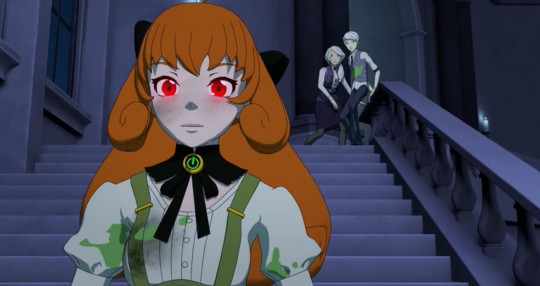
Welcome back, everyone! Can you believe it's been six weeks already? I can't. Something something the uncomfortable passage of time during a pandemic as emphasized by a web-series.
But we're here to talk about RWBY the fictional story, not RWBY the cultural icon. At least, we will in a moment. First, I'd like to acknowledge that shaky line between the two, growing blurrier with every volume. A sort of good news, bad news situation.
The bad news — to get that out of the way — is that we cannot easily separate RWBY from its authors and those authors have, sadly, been drawing a lot of negative attention as of late. This isn't anything new, not at all, but I think the unexpectedly long hiatus gave a lot of fans (myself included) the chance to think about Rooster Teeth's failings without getting distracted by their biggest and brightest production. There's a laundry list of problems here — everything from the behavior of voice actors to the quality of their merch — but as a sort of summary issue, I'd like to highlight the reviews that continue to pop up on websites like Glassdoor, detailing the toxic, sexist, crunch-obsessed environment that RT employees are forced to work in. A lot of these websites requires a login to read more than a page of reviews, but you can check out a Twitter thread about it here.
Now, I want to be clear: I'm not bringing this up as a way to shame anyone enjoying RWBY. This isn't a simplistic claim of, "The authors are Problematic™ and therefore you can't like the stuff they produce." Nor is this meant to be a catch-all excuse for RWBY's problems. If it were, I'd have dropped these recaps years ago. I'm of the belief that audiences maintain the right to both praise and criticize the work they're given, regardless of the context in which that work was produced. At the end of the day, RT has presented RWBY as a finished product and, more than that, presents it as an excellent product, one worth both our emotional investment and our money (whether in the form of paying for a First account, or encouraging us to buy merch, attend cons, etc.) I'll continue to critique RWBY as needed, but I a) wanted fans to be at least peripherally aware of these issues and b) clarify that my use of "RT" in statements like, "I can't believe RT is screwing up this badly" is meant to be a broad, nebulas acknowledgement that someone in the company is screwing up, either creatively (doesn't have the skill to write a good scene) or morally (hasn't created an environment in which other creators are capable of crafting a good scene). The real, inner workings of such companies are mostly a secret to their audiences and thus it's near impossible for someone like me — random fan writing these for fun as a casual side hobby — to accurately point fingers. Hence, broad "RT." I just wanted to clarify that when I use this it's as a necessary placeholder for whoever is actually responsible, not a damnation of the overworked animator breaking down in a bathroom. Heavy stuff, but I thought it was necessary (or at least worthwhile) to acknowledge this issue as we head into the second half of the volume.
Now for the good news: RWBY has reached 100 episodes! For any who may not know, 100 is a pretty significant number in the TV world because, when talking about prime time programming, it guarantees syndicated reruns. Basically, networks don't want audiences to get burned out with a show — changing the channel when it comes on because ugh, I've seen this already, recently too — and 100 episodes allows for a roughly five month run without any repeats, making it very profitable. RWBY is obviously not a television show and doesn't benefit from any of this (hell, modern television doesn't benefit from this as much as it used to, not in the age of streaming), but the 100 episode threshold is still ingrained in American culture. Beyond just being a nice, rounded number, it is historically a measure of huge success and I can't imagine that RT isn't aware of that. Regardless of what we think of RWBY's current quality, this is one hell of a milestone and should be applauded.
All that being said... RWBY's quality is definitely still lacking lol.
Our 100th episode is titled "Dark" — keeping with the one word titles, then — and I'd like to emphasize that, as a 100th episode, it definitely delivers in terms of plot. There's plenty of action, important character beats, and at least one major reveal, everything we'd expect from a milestone and a Part II premiere. The animation also continues to be noteworthy for its beauty, as I found myself admiring many of the screenshots I took for this recap. There are certainly things to praise. The only problem (one we're all familiar with by now) is that these small successes are situated within a narrative that's otherwise falling apart. It's all good stuff... provided you ignore literally everything else surrounding it.
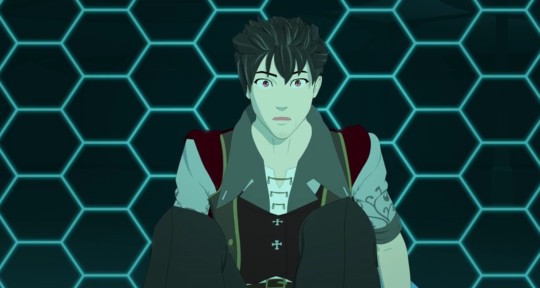
But let's dive into some examples. We open on Qrow starting, awoken by the thunder outside. Robyn has been watching him and makes a peppy comment about how none of them will be sleeping tonight, followed by a more serious, "Sounds bad out there." Yeah, it does sound bad, especially when they all know — thanks to Ruby's message back in Volume 7 — that this is due to Salem's arrival. I think a lot of the fandom has forgotten that little detail because people often discuss Qrow as if he is entirely ignorant of what is going on outside his cell. Even if we were to assume that he's forgotten all about the pesky Salem issue (the horror of Clover's death overriding everything else, perhaps) he still knows that Tyrian is running loose in a heat-less city with a creepy storm going on and, from his perspective, the Very Evil Ironwood is still running the show. So it's bad, which begs the question of why Qrow (and Robyn, for that matter) hasn't displayed an ounce of legitimate worry for everyone he knows out there. Thus far, their interactions have centered entirely around Qrow's misplaced blame and Robyn's terrible attempts to lighten the mood, despite the fact that a war is raging right beyond that wall. It's another example of RWBY's inability to manage tone properly, to say nothing of balancing the multiple concerns any one character should be trying to juggle. Just as it rankles that Ruby and Yang don't seem to care about what has happened to their uncle, Qrow likewise doesn't seem to care about what might be happening to his nieces. When did we reach a point where these relationships are so broken that someone can be arrested/chucked into a deadly battle and the others just... ignore that?
So Robyn's otherwise innocuous comment immediately reminds me of how badly the narrative has treated these conflicts and, sadly, things don't improve much from here. We are thankfully spared more of Robyn's jokes when Qrow realizes that what he's hearing can't be thunder. A second later, Cinder blasts through the wall — called it! — and Qrow instinctively transforms.
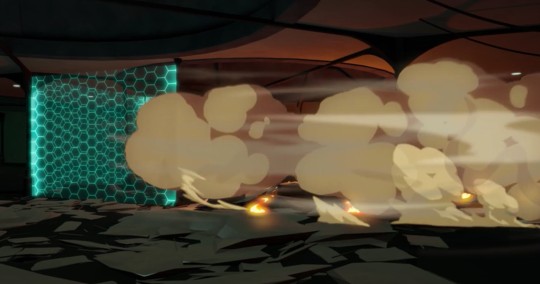
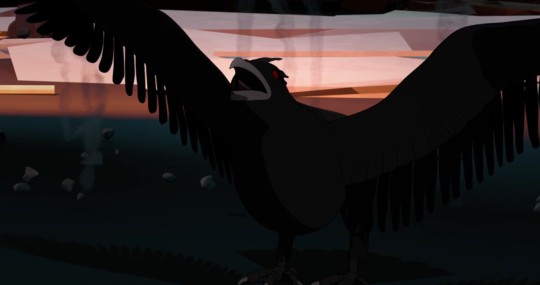
The only downside to this moment is that the whole ceiling falls down on Qrow and the others because APPARENTLY these cells don't have tops on them. Seriously. As far as I can recall we don't see the stone breaking through the forcefield somehow and this looks pretty open to me.
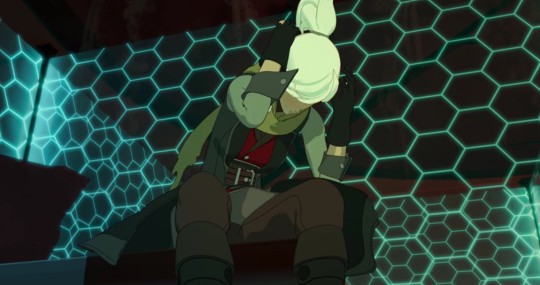
If it is... you're telling me these crazy powerful fighters who practice landing strategies and leap tall buildings in a single bound —
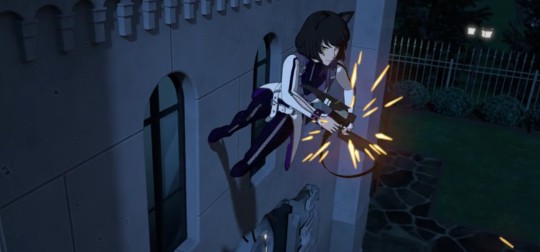
— can't just hop over this mildly high electric fence to get out? Qrow can't just fly away?
We're, like, two minutes in, folks.
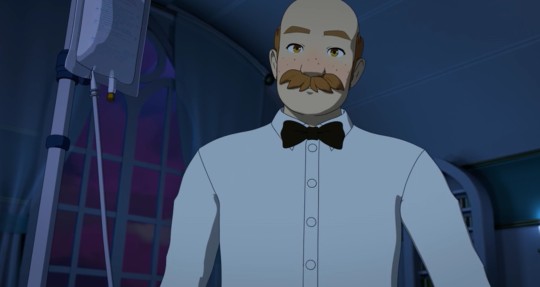
We transfer to Nora's perspective as she wakes up, seeing Klein giving her the IV. He tells her not to worry, that "you and your friend are going to be just fine." What friend? Penny? Klein went upstairs prior to Weiss hugging Whitley or Penny crash landing outside. I had thought them bursting through the door with another unconscious friend was the first time he learned what the big bang outside was, but apparently not.
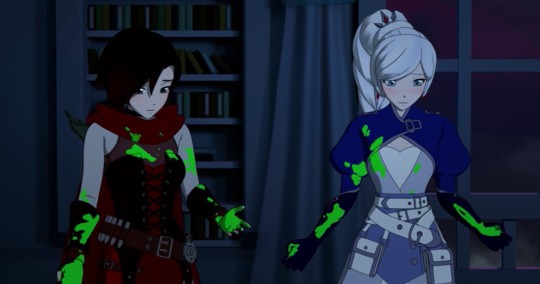
Penny is, obviously, a mess. While I now understand the choice to make her blood such an eye-catching color when that's crucial to the Hound's hunt, I still think it looks strange visually. Like someone has taken a copy of RWBY and painted over it. It doesn't look like it fits the art style. More than that, it implies some rather complicated things about Penny's humanity, especially in a volume focused around her being a "real girl." Real enough for Maiden powers, but with obviously inhuman blood that isn't even referred to as "bleeding." Penny "leaks" instead.
Toss in the fact that she's literally an android who is made up of tech — recall the running gags about her being heavy, or it hurts to fist-bump her, to say nothing of keeping things like multiple blades inside her body — yet Klein says that her "basic anatomy" is the same and he can "stitch up that wound."
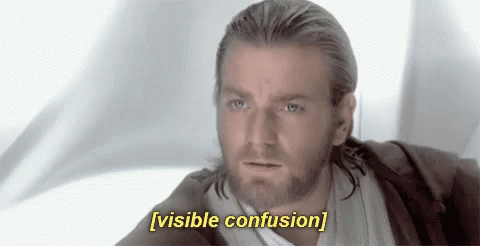
I'm sorry, what? Whatever Penny looks like on the inside, it's not going to resemble a human woman's anatomy, and Klein might be able to stitch the outer layer of skin she's got, but that won't do anything to fix whatever metal bits have been broken underneath. Penny isn't a human-robot hybrid, she's a robot with an aura. Penny has knives in her back, rockets in her feet, and a super computer behind her eyes. When our clip introduced that Klein would be the one to help Penny, my initial reaction was, "Seriously? He's a butler and a doctor and an engineer?" But RWBY didn't even try to get away with a Super Klein explanation, they just waved away Penny's very obvious, inhuman anatomy. Yeah, I'm sure "stitching up" an android wound is just like giving Nora her IV. I hope the surgical sutures he used are extra strong!
In an effort to not entirely drag this episode, I do appreciate that Whitley is allowed an "ugh" moment about the non-blood covering his shirt without anyone calling him out on it. That felt like the sort of thing the show would usually try to make a character feel guilty about and I'm glad that, for once, he was just allowed to be frustrated without comment.
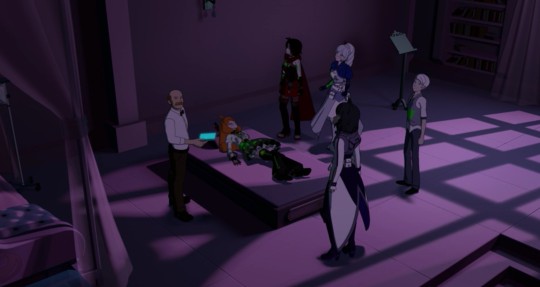
Then the power goes out and May calls, which raises questions about what state the CCTS is in and when scrolls are available to our protagonists vs. when they're not. But whatever. She's checking in because she just "saw another bombing run light up the Kingdom" and —
Wait. Bombing? Salem is bombing the city? I know we've seen explosions in the sky, but I'd always just attributed that to evil aesthetic. Why does this dialogue sound like it's from a World War II film and not a fantasy sci-fi show about literal monsters launching a ground attack?
May looks pretty against the sky though. I like her hair color against that purple.

I'm admittedly grasping at positives here because we finally return to her "You have to choose" ultimatum and — surprise! — May has pulled back completely. Ruby says that once they've helped Penny, "We'll...we'll do something!" which is once again her avoiding making a decision. Ruby still refuses to choose, instead falling back on generic, optimistic pep talks. They'll figure out how to stop Salem later. They'll think about the impact of telling the world later. They'll choose who to help later. Ruby keeps pushing these problems into the future where, she hopes, a perfect, magical solution will have appeared for her to latch onto. When that continues to not happen, others pressuring her to actually do something and stop waiting for perfection — Ironwood, Yang, May — she panics and continues stalling for time. Wait an episode and the narrative supports her in this.
Because initially May was forcing Ruby to decide. Now, May enables her desire to keep putting things off. "Don't beat yourself up, kid. At this point, I don't know how much is left to be done." That's the exact opposite of what May believed last episode, that there was still so much work and good to do for the people of Mantle. This is precisely what the show did with Yang and Ren's scenes too, having people call Ruby out... but then return to a message of, 'Don't worry, you're actually doing just fine' before Ruby is forced to actually change.
None of which even touches on May calling her "kid" in this moment. That continues to be a convenient way of absolving Ruby of any responsibility. When she wants to steal airships or Amity Tower, she's an adult everyone should listen to, the leader of this war. When the story wants to absolve her of previously mentioned flaws, she becomes a kid who shouldn't "beat herself up." I said years ago that RWBY couldn't continue to let the group be both children and adults simultaneously, yet here we are.
So that was a thoroughly disappointing scene. Ruby gets her moment to look sad and defeated, listing "the grimm, the crater, Nora, Penny" as problems she doesn't know how to solve. Note that 'Immortal witch attacking the city I've helped trap here' isn't included in that list. Ruby is still ignoring Salem herself and no one in the group is picking up where May left off, challenging her to do more than wring her hands over things others are already trying to take care of: Ironwood is fighting the grimm, May has gone off to help the crater, Klein is patching up Nora and Penny. Ruby, as one flawed individual, should not be expected to come up with a solution to everything, but she does need to stop acting like she can come up with a solution to everything when it matters most (office scene) and rejecting others' solutions when they ask for her help (Ironwood, May).
If it feels like I'm dragging the flawed, traumatized teenager too much, it's not in an effort to ignore those aspects of her identity. Rather, it's because she's also the licensed huntress who wrested control from a world leader and violently demanded she be put in charge of this battle. Ruby, by her own actions, is now responsible for dealing with these problems, or admitting she was wrong and letting others take the lead, without purposefully derailing their plans. She doesn't get to suddenly go, "I don't know," cry a little, and get sympathetic pats.
But of course that's precisely what happens, courtesy of Weiss.
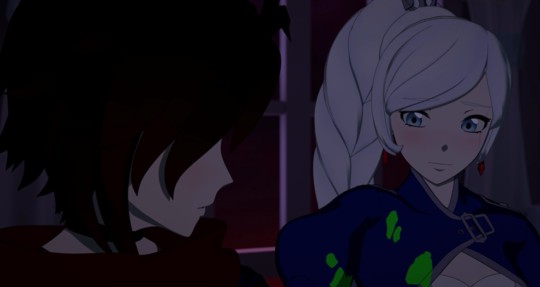
During this whole scene I kept wondering why no one was celebrating Nora waking up, especially when Ruby outright mentions her. Have they just not noticed given all the Penny drama? Because Nora absolutely woke up.
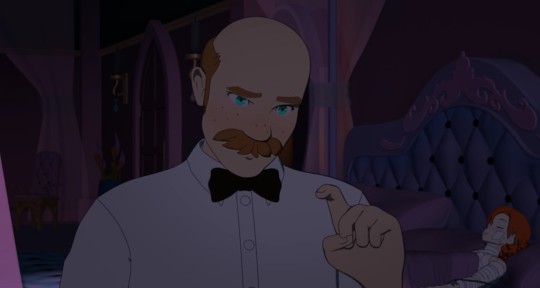
Aaaand went back to sleep, I guess. What was the point of that POV shot? No worries though, she'll wake up again in a minute.
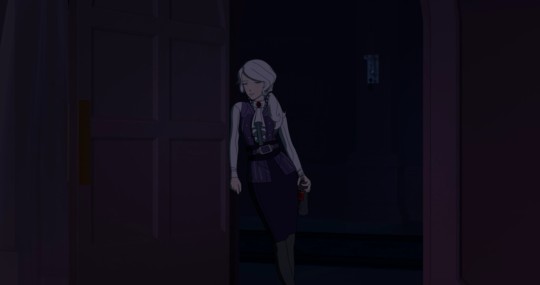
Willow arrives and announces that they can fix the power (and Penny) using the generator at the edge of the property. I'm convinced RT doesn't actually know what a generator is because the characters are acting like it's some super special device that only richy-rich could possibly have. Whitley says that it's the SDC executives who have their "own power supply" and that it's "extremely unfair." Now, don't get me wrong, a good generator powering large portions of your house can run you 30k+, but you can also get one that plugs into your extension cord and powers your fridge for a couple hundred. There's absolutely a class issue here, just not the one Whitley and Weiss seem to be commenting on. They make a generator sound like the sort of device that only a politician-CEO could possible have and it's weird.
Likely, it sounds weird because it's a choppy way of getting Whitley to bring up the wealth disparity so he can then go, 'That's right! We're crazy rich with a company housing tons of ships! We can use those to evacuate Mantle.' Awkwardness aside, I do like that the Schnee wealth is being used for good purposes, but... evacuate where? To the city currently under attack by a giant whale? In a RWBY that wasn't determined to demonize Ironwood, this would have been a great plot point during the office scene instead, with Weiss offering her services to Ironwood, even if the group decides that a continued evacuation still isn't possible.
Instead, we get it here from Whitley. Do I need to point out the obvious? That Whitley is the MVP of this episode? He's done more good in an HOUR than the group has managed in a year. Give this kid some training and make him a huntsmen instead.

We're given a (very pretty!) shot of the shattered moon because it wouldn't be RWBY if we weren't continually reminded that gods once wiped out humanity before destroying part of a celestial body... and absolutely no one talks about that lol.
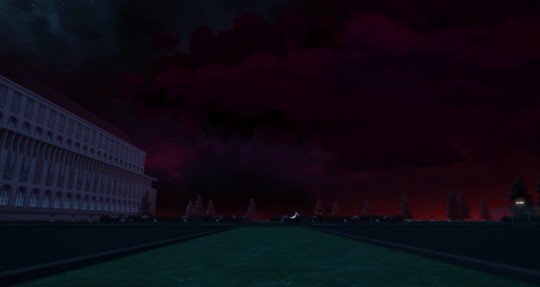
Blake's coat might not make any sense for her color scheme, but it does make her easy to spot as she and Ruby run across the grounds. Oh my god, they're actually doing something together! It only took eight years. They even get a lovely talk where Blake admits how much she looks up to Ruby, despite her being younger, and once again I'm struck at how much more I would have loved this scene if it had appeared elsewhere in the series. It is, indeed, as sweet and emotional as all the RWBY GIF-ers are claiming... provided you overlook that this is the exact opposite of what Ruby needs to hear right now. She doesn't need to hear that she's more mature and reliable than her elders when she's functioning under a "We don't need adults" mentality. She doesn't need to hear that not knowing what to do is totally fine, not when that led to her turning on Ironwood, despite not knowing how to stop Salem. She doesn't need to hear that "doing something" — doing anything — is a strength, because Ruby keeps avoiding the big problems for smaller ones she's comfortable with, like standing by Penny's bedside instead of deciding between Mantle and Atlas. Blake's speech is heartfelt, but it's a speech that suits a Beacon days Ruby who is having some doubts about her leadership skills, not the girl whose impulsive — and now lack of — actions is having world-wide repercussions. Everyone is babying Ruby to a staggering degree. It's like if we had a med show where the doctor is standing by the bedside of a coding patient, fretting between two treatments. 'Don't worry,' their colleague says, patting their shoulder. 'I've always looked up to you. You'll do something when you're ready' and then they continue to watch the patient, you know, die.
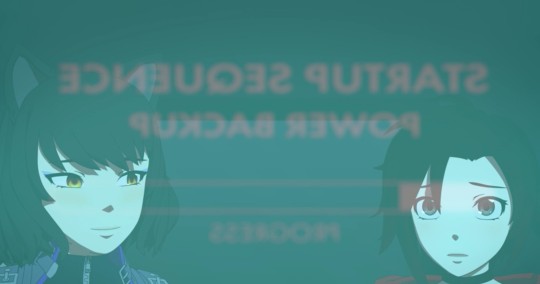
Also: who does Ruby look up to? Everyone talks about how much they depend on and trust Ruby, but who does Ruby look to for guidance? A number of her problems stem from the fact that she has rejected the advice of everyone who has tried to help her improve: Qrow, Ozpin, Ironwood, even Yang. Ruby is presented as the pinnacle of what to strive for in a leader, rather than a leader who has only been doing this for two years and still has a great deal to learn.
Anyway, they get the generator on and the Hound shows up.
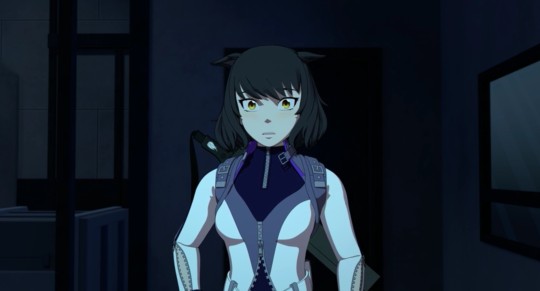
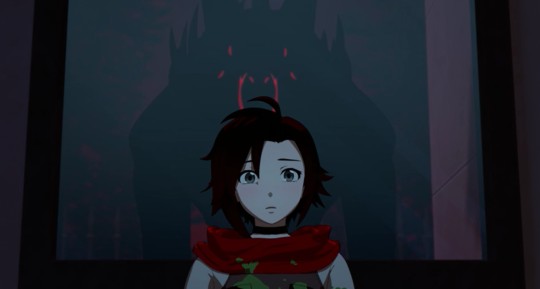
I am begging RT to just make RWBY a horror story. All their best scenes the last three years have been horror I am bEGGING —
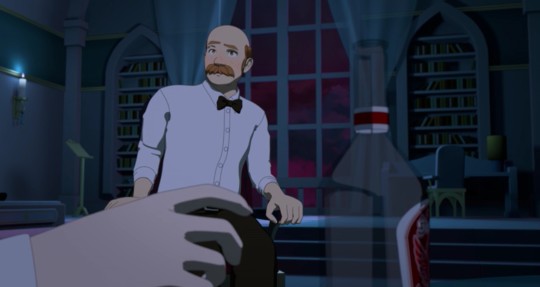
Anyway, while Ruby waits to be eaten we cut to Willow and Klein, the former of which is reaching for her bottle, pulling back, reaching again, all while her hand shakes. This is good. This is what we should have gotten with Qrow. Which isn't to say that their (or anyone's) addiction should be identical, but rather that this is a far more engaging and complex look at addiction than what our birb got. Willow tells us that she doesn't drink in the dark despite bringing the bottle with her; tries to resist drinking when she's scared and ultimately fails. Qrow just decided to stop drinking after decades of addiction, seemingly for no reason, and that was that. Why is a side character we only met this volume written better than one of the main cast?
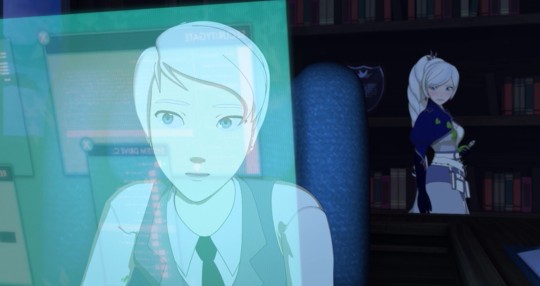
Blake manages to call Weiss about the Hound and she asks if Whitley can handle the airships without her. I mean, I assume so given that Weiss is looking at the bookshelves while Whitley does all the work lol. He makes a teasing comment about how he can if she can handle that grimm and she comments that they still need to work on his "attitude."
No they don't. Weiss stuck a weapon in her kid brother's face. Whitley made a joke. Even if Weiss' comment is likewise meant to be read as teasing, it's clear that we've bypassed any meaningful conversation between them. That hug was supposed to be a Fix Everything moment even though, as I've laid out elsewhere, it didn't even come close.
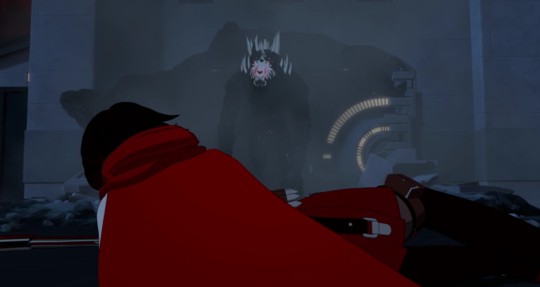
We cut back to Ruby getting thrown through a wall into the backyard and the Hound creepily coming after her. She's freaked out by this clearly abnormal grimm and Blake is weirdly... not? "It's just a grimm. Just focus!" Uh, it's obviously not. Have we reached the traumatized, sleep-deprived point where the group is sinking into full-blown denial? I wouldn't be surprised. They've been awake for like... 40+ hours.
Because the Hound knocks Ruby out with a single hit. Just, bam, she's down. "Focusing" is not the solution here.
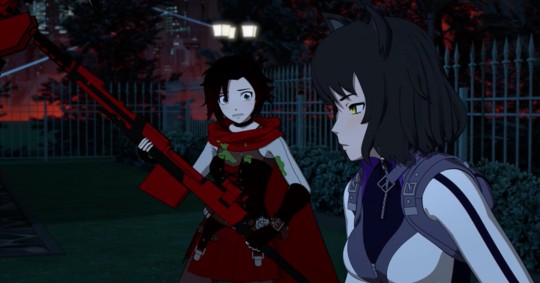
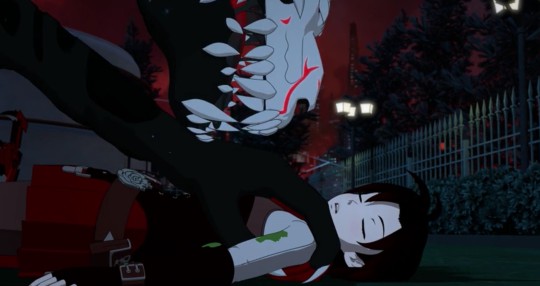
Weiss calls to warn the others about the grimm, telling them to stick together. Willow (understandably) starts freaking out and flees the room (classic horror trope!). Klein is left alone when Penny wakes up with red eyes. Oh no!
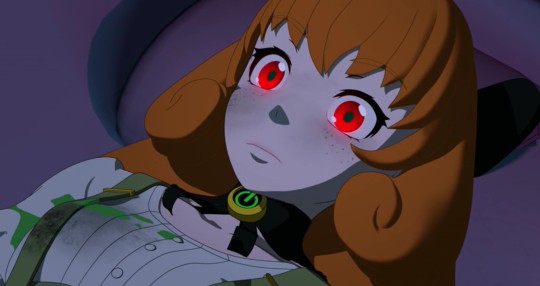
Don't worry. You know nothing meaningful happens.
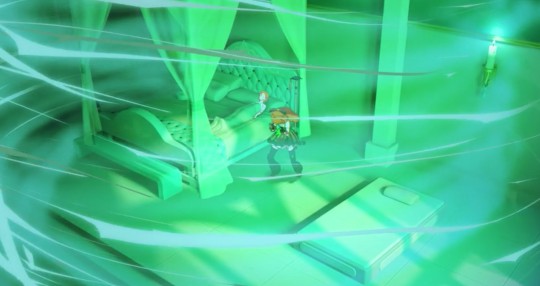
She shoves Klein before (somehow?) resisting the hack, her Maiden powers going wild in the process. Just when it looks as if Penny might cause some serious damage, Nora wakes up, takes her hand, and says, I kid you not:
"Hey... no one is going to make you do anything you don't want to do... It's just a part of you. Don't forget about the rest."
Okay. I want to re-emphasize that I love hopeful, uplifting, victory-won-through-the-power-of-love stories. Istg I'm not dead inside, it's just that RWBY does this so badly. I mean, what is this? It has similarities to the character shouting, 'No! Resist!' to their mind-controlled ally, but this is not presented as a desperate, last-ditch effort by Nora. She just speaks like this is the most obvious truth in the world. If you don't want to have your mind taken over... just don't! It's that simple. The problem definitely isn't that Watts has changed her coding and has implemented a command she can't override, it's that Penny has forgotten about the "rest" of her personhood.
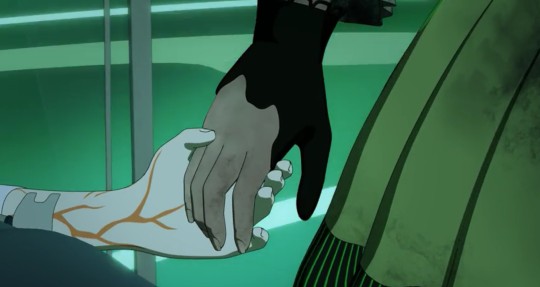
And this works. Granted, not for long, but we leave Nora having successfully calmed Penny down and until her eyes unexpectedly go red again scenes later, we're left assuming that this is a permanent solution. That, imo anyway, is taking the Power of Love too far, overriding the basic reality of Penny being hacked. It’s not a personal failing she must overcome, it’s an external attack. I would have rather had Nora react to the scars she saw on her arm, or have a moment with Klein, or get some love from the group. Not a wakes up, falls asleep, wakes up again to save Penny with a Ruby level 'Just ignore reality' pep-talk, then back to sleep again.
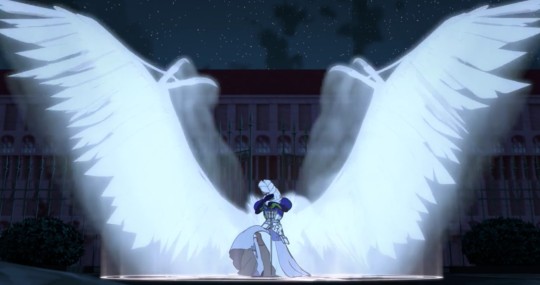
So Penny isn't attacking her allies, or mistakenly hurting her allies with wild Maiden powers. Not that the group doesn't have enough to deal with, but still. Weiss arrives to help with the Hound and attempts a new summon, only to fail when two minor grimm burrow up into her glyphs. I really enjoyed that moment, both for the wing visual and the knowledge that Weiss' glyphs can fail if you break them somehow (which makes sense). Also, I just like that she failed in general? Weiss is, as per usual now, about to demonstrate just how OP she is compared to the rest of the team, so it was nice to see her faltering here.
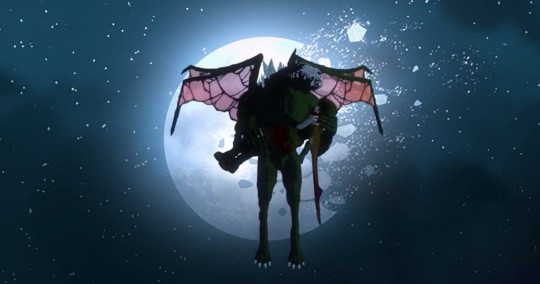
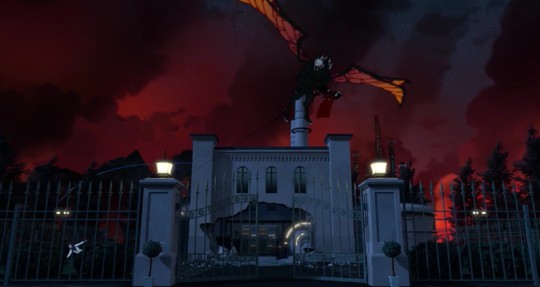
The Hound tries to make off with Ruby and Blake does an excellent job of keeping it tethered. Ruby finally wakes, only to realize that the grimm is actually after Penny since it's staring at her power up through the window, no longer trying to escape. Moments like this remind me that there's someone on RT's writing team that knows what they're doing, at least some of the time. The assumption that the Hound is after Ruby as a SEW, the surprise that it's actually Penny, realizing it holds up because Ruby is covered in Penny's blood and Blake is not... that's all nice, tight plotting. More of that please!
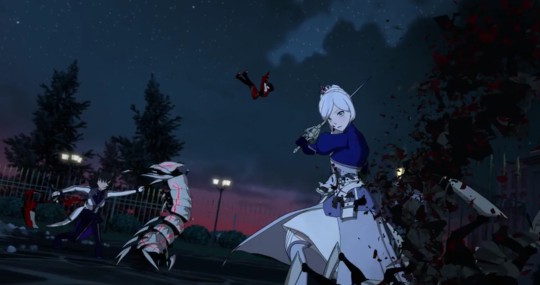
The Hound drops her and Ruby's aura shatters when she hits the ground. I want everyone to remember this moment as an example of how strong the Hound is. The group may be tired, but unlike YJR they've been sitting around in the Schnee manor for a number of hours, regaining strength. We saw the Hound hit Ruby twice — once through the wall and once to knock her out — and then she falls from a not very high distance for a huntress, yet her aura is toast. That's the level of power and skill the Hound possesses. Decimating YJR, knocking Oscar out, same for Ruby, avoiding Blake and Weiss' hits, soon to treat Penny like a ragdoll. Just remember all this for the episode's end.
Blake tells Weiss she'll take care of Ruby, you go help the others. Yay breaking up the duos more! Bad timing though as the new acid-spitting grimm pops out of the ground and Blake is now left alone to face it.
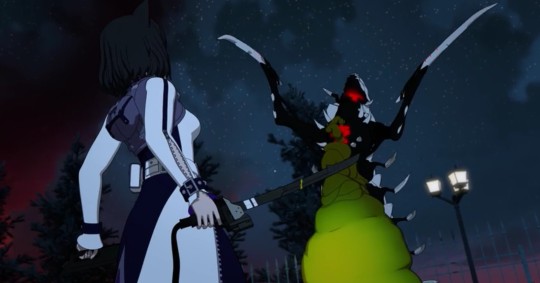
Weiss re-enters the mansion, knowing the Hound is somewhere nearby, but not where. Suddenly, Willow's voice sounds through her scroll with an, "Above you!" which... doesn't keep Weiss from getting hit lol. But it's the thought that counts! Willow has accessed the cameras she's set up throughout the manor, watching the Hound's movements, and I have to say, that is a WAY better use of her separation from Klein than I thought we were getting. I legit thought they'd have Willow run away in a panic, meet the Hound, die, and then Weiss could be sad about losing her mom.
It does say something about RWBY's writing that this was my knee-jerk theory, as well as my surprise when we got something way better.
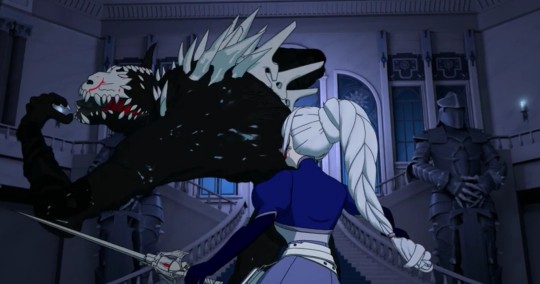
The Hound runs off, uninterested in Weiss, and she asks Willow to keep tabs on it. It heads for Whitley next (also covered in Penny's blood) and very creepily stalks him in the office with a, "I know you're here." Whitley is seconds away from being Hound chow before one of Weiss' boars pin it against the wall. He runs, then runs BACK to finish deploying the airships, before finally escaping assumed death. Goddamn this boy is pulling his weight.
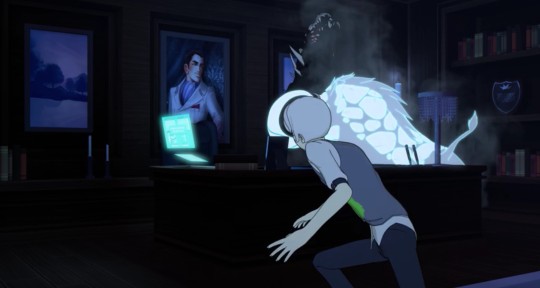
I assume all these ships are automated then? I hope someone takes a moment to call May. Otherwise it's going to be super weird for the Mantle citizens if a fleet of SDC ships just show up and hover there...
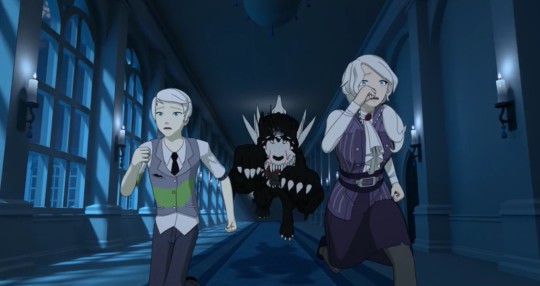
I don't entirely understand how Weiss saved him though. She's nowhere to be seen when Whitley leaves and he runs a fair distance before he and Willow encounter Weiss again. We know her summons don't have to keep right next to her, but are they capable of rudimentary thought, attacking an enemy — and an enemy only — despite Weiss being a couple corridors down and unable to see the current battlefield? I don't know. In another series I'd theorize that this was a deliberate hint, a way to clue us into the fact that Willow, someone who we currently know almost nothing about, had training in the past and summoned the boar herself. Weiss and Winter certainly didn't get that hereditary skill from Jacques. Hell, we might still get that, Weiss reacting with confusion next episode when Whitley thanks her for the boar, but I doubt it. That scene with Ruby and the Hound aside, the show isn't this good at laying groundwork and then following up on it.
Case in point: Weiss says, "I didn't forget you" to Whitley after he gets away from the Hound, the moment trying to harken back to her promise to Willow. Key word is "trying." Because she absolutely forgot him! Weiss threatened and ignored Whitley until he proved his usefulness. I also shouldn't need to point out that, "Don't forget your brother" does not mean, "Don't let your brother die a horrible death by abnormal grimm." Weiss acts like her saving him is a fulfillment of her promise, rather than just the most basic of human decency. And also, you know, her job.
So that part is frustrating. The entire Schnee dynamic is a mess, from Weiss making a joke of her father's arrest, to Willow (presumably) fixing their relationship by putting a hand on her daughter's shoulder. Okay.
Then Weiss cuts off the Hound by summoning a giant wall of ice. My brain, every time this happens:
YOU COULD HAVE FIXED THE HOLE IN MANTLE'S WALL.

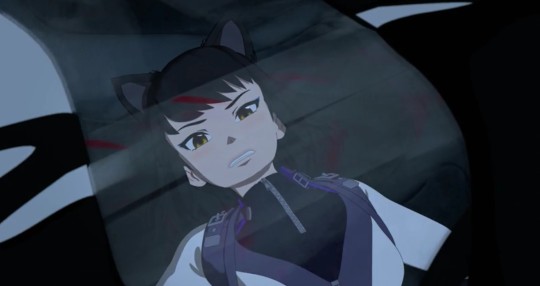
Moving on, Blake's fight against the acid... thing has some great choreography, including Blake using her semblance which we haven't seen in AGES.
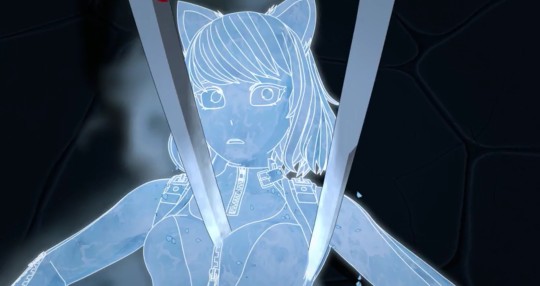
I really like the fight itself, just not what Blake is shouting the whole time. "I need you, Ruby! We all need you!" This has really gotten ridiculous. Ruby is presented as everyone's sole savior despite failing time and time again. It's not that I don't think Blake as a character should have faith in her leader, it's that I don't think the writers should be crafting a story where everyone puts their unshakable hopes in an untrained, disloyal, impulsive 17 year old. I mean, Ruby is currently unconscious, yet Blake is acting like if she doesn't wake up — she, as an individual, if Ruby Rose does not re-join this fight — then all is lost. If Ruby doesn't save them, no one can. Which is, of course, absurd on numerous levels. Blake doesn't need the passed out, aura-less Ruby right now, she needs the still very healthy Weiss pulling out multiple summons and an ice wall! Use your scroll and call for backup again.
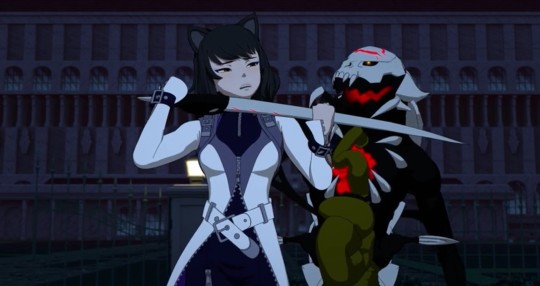
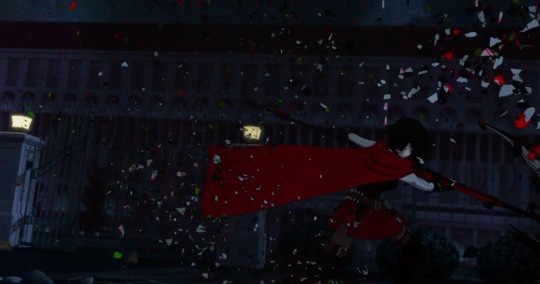
But of course, Ruby wakes up and kills the new, terrifying grimm with a single hit. It's a preview of what's to come with the Hound and it's just as ridiculous here as it will be there.
Speaking of the Hound, am I the only one who thought this was... cute?
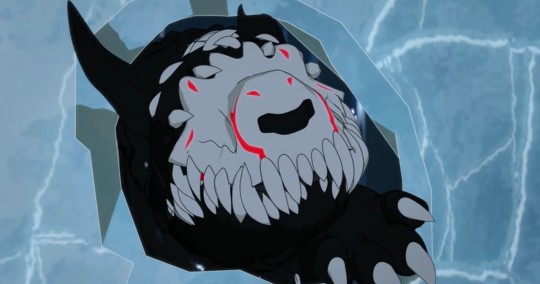
I can't possibly be the only one. That head-tilt is exactly what my dogs do and my brain instinctively went, "Aww, puppy!"
Murderous puppy.
The Hound realizes none of the Schnees are who it's looking for and runs off. Penny, meanwhile, has been fully taken over because, well, that's just what's convenient now. She resists long enough keep Amity up, then succumbs, then resists to apologize to Ruby, then succumbs, then resists because Nora asked her to, then succumbs once it's time to knock her out. If RWBY was willing to commit to consequences, Penny would have been taken over and that was that. The characters would need to deal with whatever outcome happens as a result. Instead, the show very carefully avoids any of those pesky consequences by having Penny successfully resisting at key moments, despite no explanation of how she's managing that.
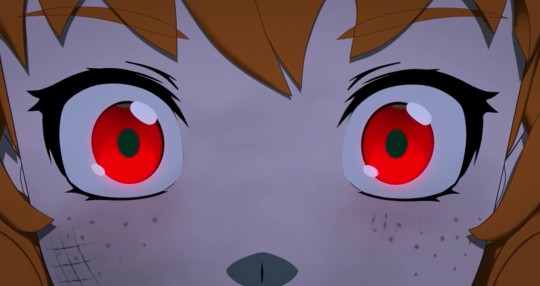
She shoves Klein again (Klein is having a Bad Time) and starts walking down the main steps. When Whitley wants to know where the hell she's going, Penny mechanically responds that she must "Open the vault, then self-destruct." I suppose the change Watts made was the self-destruct order? Ironwood obviously wants the vault open, though not necessarily Penny's death. Think what you will of his moral compass, she's a damn powerful ally — a research project, perhaps — and a Maiden to boot. At the very least, her death may give the powers to someone even worse.
God, please don't let them have brought Penny back and made her a Maiden just to kill her again.
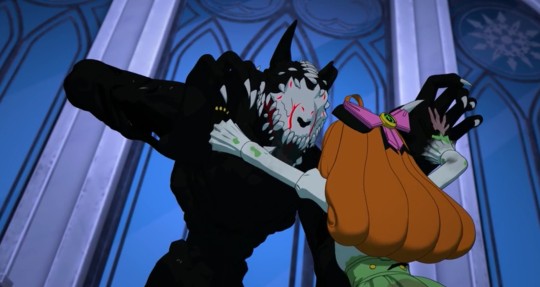
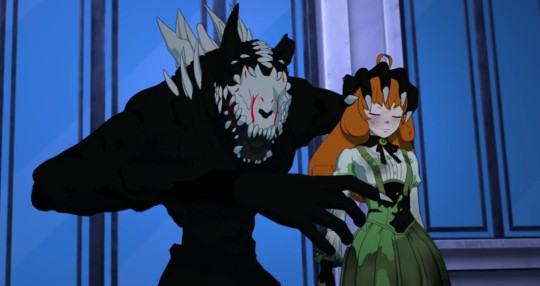
The Hound arrives though and, as said, knocks Penny out. We're back to square one with her, then. Note though that this attack is near instantaneous. She grabs its hands one second, is hanging limply the next. Wow, the Hound sure is a terrifying antagonist!
Not for long.
"That's enough," Ruby says and one-shots it with her eyes.
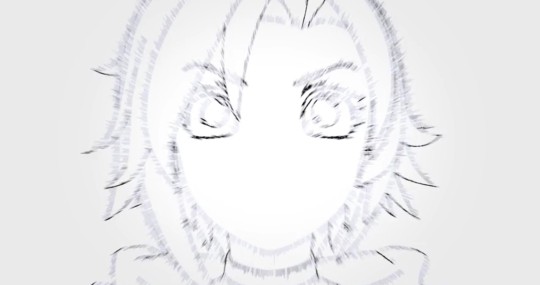
Now, I want to talk for a moment about the implications of that line. "That's enough." Obviously Ruby is #done with this situation and emotionally unwilling to let the Hound kidnap Penny (congratulations, Nuts and Dolts shippers), but there's a meta reading here as well. Not intentional, but glaring to me nonetheless. Basically, the idea that the Hound has, from a plot perspective, done enough. It has served its singular purpose. It kidnapped Oscar and now it dies. Never-mind how insanely powerful we've established the Hound to be, never-mind how Ruby's eyes also work or don't work according to whether anything of actual import is on the line. From a plot perspective "that's enough" and the Hound can be disposed of instantly. It got Oscar and gave us an episode of filler creepiness. Move along now.
The idea behind Ruby's eyes isn't bad, but the execution absolutely is. RT has undermined a huge portion of the stakes by giving their protagonist an instant kill-shot that always works precisely when she needs it to. Starting with the Apathy, we have yet to get a moment where Ruby's eyes fail to save the day when she really needs them to, no matter how incredible the challenge. The Hound was very intentionally written to be a grimm outside of the group's current power level. It thinks, it talks, they literally can't touch it. This creates the expectation that the group will need to grow stronger — or at least become smarter — in order to surmount this new obstacle, yet Ruby's eyes undermine all of that. The group hasn't grown in years, the show just makes enemies weaker as needed (Ace Ops), or has Ruby pull out her eyes as a trump card. It wouldn't be that bad if we'd at least gotten a good battle out of it, one where the group gets close to defeating the Hound on their own, but needs Ruby's eyes to finish it off. Instead, she literally walks up without any aura, announces to the audience that this antagonist's time is up, and blasts it out a window.
Granted, Ruby's eyes don't completely finish it. The Hound pulls itself to its feet and we see this.
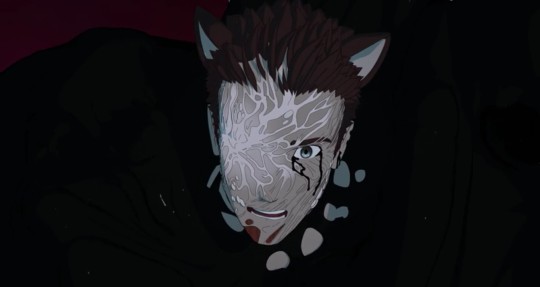
Yup, that's a guy and yup, those are silver eyes.
I would like to issue a formal apology to the "It's secretly Summer!" theorists in the fandom. I mean, I still think it would be ridiculous (and at this point highly improbable) that Ruby's dead mother has actually been a grimm mutant this whole time, just hanging out in Salem's realm while she waits for the plot to start before attacking the world, and then sends some no-name faunus dude after the group instead of their leader's mother for extra, emotional torture... but you all were definitely right about the “It's a person” part! I... don't know how I feel about this. Admittedly, it seems to be a logical continuation of the other grimm-human hybrids we've seen — namely Cinder and Salem herself — and it finally explains why Salem wants Ruby alive (even though it actually doesn't because WHY did she want more SEWs for Hound grimm when she wasn't even attacking back then? And already has all these other insanely powerful tools??), but at the same time, it feels like it's complicating a story that doesn't need further complications. The group fights monsters and has an immortal enemy. You don't need to add 'Some of those monsters are secretly human' to the mix.
It doesn't hurt that this twist is giving me Attack on Titan vibes, which, ew. A dark time in my fandom life, folks.
The Hound staggers a few steps before Whitley and Willow dump a suit of armor on it. That's all it takes to kill the most dangerous grimm we've ever seen: a single flash of silver eyes and some heavy metal. This also wreaks havoc with the implication that Salem wants SEWs alive because they create such powerful grimm. Obviously not. I mean yeah, normal huntsmen are going to have serious problems, we’ve seen that this volume, but any other SEWs nearby will take a Hound out instantaneously. For a villain with so many other powerful abilities — immortality, magic, endless normal grimm, her nifty soup — Salem would be much better served just killing SEWs straight out. Clearly, creating Hounds isn't worth the effort.
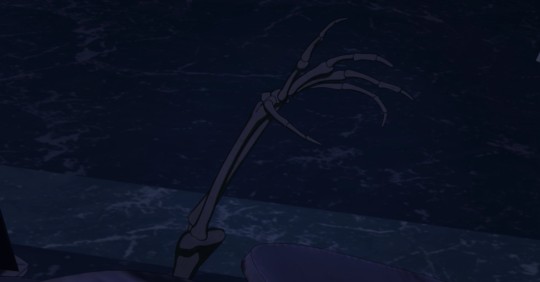
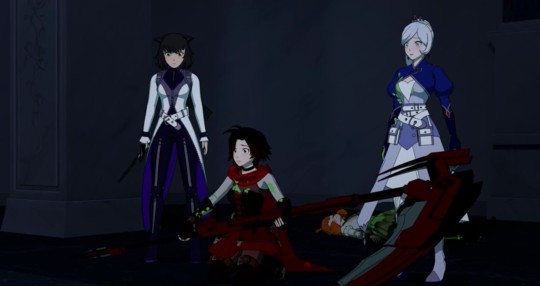
The Hound leaves some bones behind and Ruby collapses to her knees, overcome with the knowledge that this was once a person. Again, uncomfortable Attack on Titan parallels.
We finish our premiere with Cinder clearing away rubble to reveal Watts. Honestly, I like that we ended on this because her rescue is hilarious. She just slings him over her shoulders like a sack of potatoes and blasts off with her magic fire feet. Fantastic.
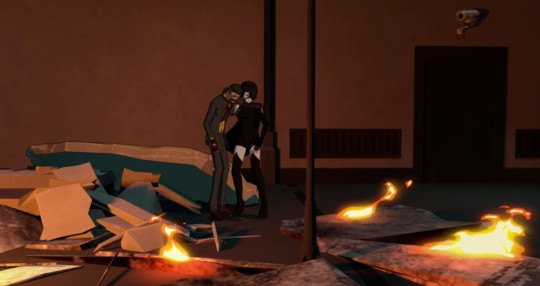
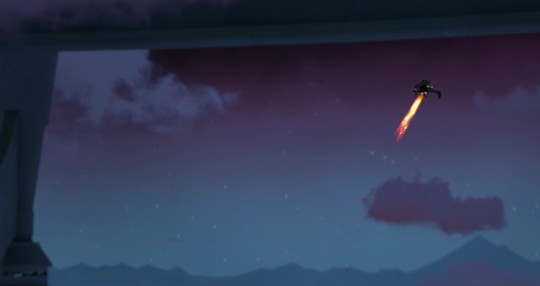
Note though that with this scene we've seen almost everything from the clip and the trailer. What's to come in the rest of Volume 8? No idea. Outside of Winter leading the charge with the bomb, we got it all here.
Time to update the bingo board!
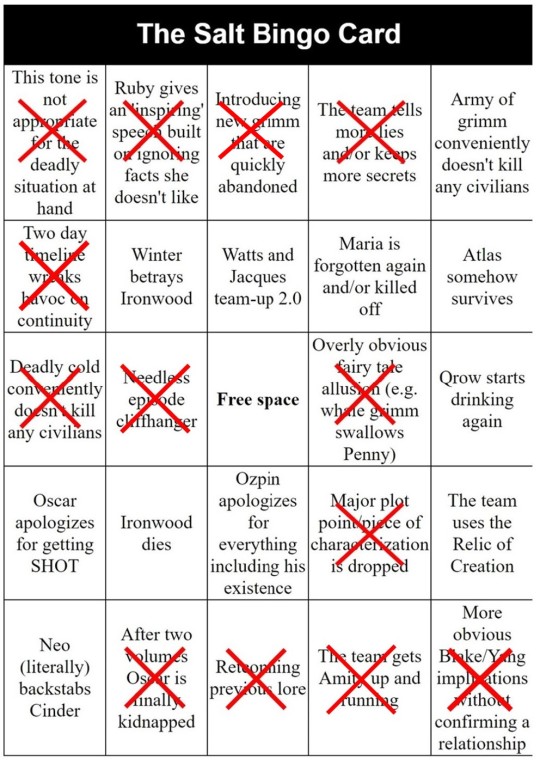
I'm crossing off "Introducing new grimm that are quickly abandoned." Between the Hound and acid-dude both falling to a single blast/cut from Ruby, we've more than earned this square.
It doesn't look as if we'll get another Watts-Jacques team-up now that he's left, but you never know.
Maria's got me worried. I feel like her Yoda fight against Neo is the one thing she'll be allowed to do this volume, but given that we didn't see anyone except Ruby's group this episode, we don't yet know whether the story is now ignoring her and Pietro, or if they'll re-appear in another episode like YJR.
Qrow is free. Will he get a drink before trying to murder Ironwood? Perhaps.
Still no bingo :(
All in all, the episode was by no means horrible. I think there were lots of horrible parts, but also some legitimately well executed moments, fun action, and scenes that I can easily imagine as squee worthy if you lean back and squint. Everything is comparative and in the growing collection of bad RWBY episodes, this one isn't securing a top slot. Which doesn't mean I think it's good, just... not as bad as it could have been and primarily only bad due to long-running problems, not things this specific episode has done. That's my bar then, so low it has officially entered the underworld.
Still, RWBY is back and a part of me is eager to see where this volume takes us, for better or for worse.
Until next week! 💜
[Ko-Fi]
75 notes
·
View notes
Link
With the film industry as we know it—A-list stars swanning around studio lots amid the swirling winds of an entire city bellowing buzzwords about makin’ pictures—essentially nonexistent at the moment, here’s an especially provocative idea as we contemplate its eventual return: What if Hollywood was... better?
Not in terms of quality of output, though if we’ve learned anything through the industry’s glacial inching toward progress, that will follow suit. But what if the industry was more inclusive? What if it was less afraid of change? What if it allowed gay people, people of color, women, and minorities to tell their own stories, to be in charge—and what if the people accepted it?
Better yet, what if it was always that way?
Like the loud, harsh clack of a clapboard coming down on 70 years of motion picture history, Ryan Murphy’s revisionist manifesto Hollywood arrives Friday on Netflix with blinding, blaring, technicolor confidence. Hardly subtle, deliciously ostentatious, and admirably mischievous, the lavish seven-episode series is a love letter to Hollywood by way of 2020 think piece.
It is messy and thrilling, upsetting yet profound; as uneven and as enthralling as any of Murphy’s big-swing, genre-contorting efforts: Glee, American Horror Story, or The Politician. But as with his soapy historical study Feud: Bette and Joan, it is a fastidious celebration of a glamorized time in Hollywood that mines nostalgia for modern meaning—a fragile undertaking swaddled in the dazzle of unmatched production design and talent pedigree.
Hollywood flops as often as it soars, but never rests in its grandiosity and ambition. The result is something escapist and frothy at a time when a retreat to a Hollywood happy ending is as alluring a fantasy as they come.
There is brilliant acting and there is bad acting. There are ovation-worthy ideas and there are off-putting ones. But, above all, there is reason to watch: It is gay, it is sexy, it is Patti LuPone.
Hollywood is a revisionist history of cinema’s golden age. It’s the 1940s in all their glamour and art: Casablanca! Citizen Kane! Alfred Hitchcock! Jimmy Stewart! Rita Hayworth! Cary Grant! It’s an era that’s been romanticized for so long that we’ve internalized it, morphing our own lifestyle aspirations to conform to its very heteronormative, very patriarchal, very (very) white ideas about sex and gender roles. These were ideas, however, that the industry was telegraphing, but not living in real life. Not at all.
Murphy and his team’s rewriting of history pulls the curtain back, exposing the sexually fluid proclivities of the stars—leading men sleeping with male escorts; Oscar-winning actresses in bisexual affairs—and the damning, racist barriers to inclusion fortified by studio heads thwarting any opportunity for progress.
Then, and here’s the crux of the whole thing: Hollywood changes that narrative. We glimpse the power dynamics inside Tinseltown’s gilded cage, and watch them being dismantled.
Some of the players’ narratives are real, and some are fiction. That makes for an amusing parlor game for viewers, attempting to separate the true history from the imagined one, and should birth a cottage industry of “The Real Story Behind…” stories in the weeks to come. But these are actual people who never had the opportunity to live authentically or see true, equal opportunity in the industry. Expect there to be a split among those who find happier, reimagined fates for them a sweet gesture, and those who find it in bad taste.
The story trains in on Jack (David Corenswet), a World War II veteran arriving wide-eyed in Hollywood, hoping some gumption and a jawline God shed a tear after creating will be enough to get him into the pictures. But he’s got a pregnant wife (Maude Apatow) to think about. Until he catches the eye of a casting director, he has to find some way to pay the bills. That cash flow comes surreptitiously from a gas station owner (Dylan McDermott), whose dashed Hollywood ambitions leave a soft spot for attractive dreamers like Jack—particularly ones who prove lucrative in his under-the-table prostitution business. A customer comes in for a fill-up, so to speak, and whispers the code, “I want to go to Dreamland,” and, well, you know the rest—and hopefully get the hardly nuanced metaphor about sex, power, sacrifices, and Hollywood.
This gas station business is without a doubt inspired by Scotty Bowers, the notorious L.A. hustler who died last year at 96, following a scandalizing, dishy documentary and memoir revealing the brothel he ran out of a petrol stand, sleeping with (allegedly) Cary Grant, Spencer Tracy, Bette Davis, Vivien Leigh, Gary Cooper, J. Edgar Hoover, and Rock Hudson.
McDermott’s character, however, is not actually Scotty Bowers, a distinction that’s necessary because Rock Hudson actually is a character, played by Jake Picking. So is Henry Wilson, the monstrous, closeted Hollywood agent played by Jim Parsons, who trades blowjobs for representation. Elsewhere, real-life trailblazers like Hattie MacDaniel, Vivien Leigh, and George Cukor show up. Their presence, on the one hand, lends credibility and grounds the fantasia of diversity and acceptance that Hollywood builds to. It’s also morally amorphous.
Hudson was closeted until the day he died of HIV/AIDS. He didn’t get the happy ending imagined here, publicly coming out of the closet by attending the Academy Awards with his fictional black, gay screenwriting boyfriend, holding hands on the red carpet, and staying on track on his ascension to Hollywood hunk. There’s also no evidence that Wilson, as caustic and self-loathing as the devil himself when we meet him in the show, had a change of heart and becomes a LGBT crusader seeking amends and atonement.
The wishful thinking is nice. But the bleakness of the reality shouldn’t be forgotten. There’s no clean place to land there, other than to consider both.
But these are just a handful of Hollywood’s players, and not even the true engine of the plot. In typical Murphyland fashion, there is a dizzying constellation of characters and their errant business to keep tabs on.
At the forefront is Patti LuPone’s Avis, the bored wife of a studio head (a scene-stealing Rob Reiner) who is first introduced as a client of Jack’s—hence all the press about the Tony winner’s explicit sex scenes that you’ve likely been reading—and eventually put in charge of the studio itself when her husband is incapacitated by a heart attack.
If it’s novel now to think of a female in charge of greenlighting projects and making commercial creative decisions, imagine it seven decades ago. And Avis shakes things up. With a casting director (Holland Taylor, perfect) and producer (Joe Mantello, heartbreaking) as her conspirators, she greenlights and positions as the studio’s next blockbuster a film called Meg, with its historically diverse creative team intact.
That means half-Filipino director Raymond (Darren Criss), black screenwriter Archie (Jeremy Pope), black leading lady Camille (Laura Harrier), and Jack and Rock in supporting roles. It takes willfulness to bulldoze the fortresses that bar progress. That is invigorating and moving to watch, especially as Hollywood dances between comedy, camp, earnestness, and tragedy with all the glee, if you will, that you’d expect from a Ryan Murphy production.
There’s sex—hot sex, gay sex, interracial sex, intergenerational sex—and there’s farce and there’s a wardrobe and set budget to sweep you away like a riptide.
There are scenes from Parsons and LuPone that will win them Emmys. Mantello and Taylor have a two-hander together that shattered me into so many pieces I am billing Ryan Murphy the cleaning fee. I worry that even with his Netflix money it won’t be enough—that’s how good it is.
Mira Sorvino and Queen Latifah give so much in their scenes as guest stars that you wish they were in more but are grateful for the flawless blips of bliss, while Michelle Krusiec as Anna May Wong, the first Chinese American movie star, is the epitome of an actor making a monumental moment out of limited material.
Criss solidifies his leading-man status—he’s captivating in every scene, even without much to do—and Corenswet brings glimmers of gravitas to eye candy. But the rest of the kids nearly torpedo the whole damn thing, they’re so miscast. The scenes with the older generation are so rich and such an utter joy to watch, it only makes the woodenness of performers like Picking and Harrier all the more egregious. Thankfully, there’s a larger message to it all that acts as absolution.
If Hollywood were a treatise on how society interacts with movies and TV both then and now, then the thesis could likely be boiled down to an early conversation between Raymond, Criss’ director character, and Dick, Mantello’s studio exec. It’s Raymond’s dream to direct a movie starring Anna May Wong. Dick kills the pitch, saying no one will pay to see a movie with an Asian lead, or any lead of color.
Raymond doesn’t stand for that. How does he know? No one’s tried. “Sometimes I think folks in this town don’t really understand the power they have. Movies don’t just show us how the world is, they show how the world can be. If we change the way that movies are made, you take a chance and you make a different kind of story, I think you can change the world.”
It’s not a stretch to argue that as the mission statement of Murphy’s entire career. He’s proved it time and again, from Glee to Pose: Bring the marginalized out of the margins and watch how things change. Someone just has to be the one to do it.
In essence, Hollywood sees Murphy dramatizing the progress that he played a part in catalyzing today, but imagining if it had come at a different turning point in cinema history—70 years ago. More tantalizingly, he raises the question of what society today might be like had it actually happened then.
Is it a little self-congratulatory? Sure. But, hey, that’s showbiz, kid.
#darren criss#the daily beast#hollywood#press#hollywood spoilers#just in case#april 2020#hollywood review
39 notes
·
View notes
Text
BBC’s The War Of The Worlds blog - Episode 3
(SPOILER WARNING: The following is an in-depth critical analysis. If you haven’t seen this episode yet, you may want to before reading this review)
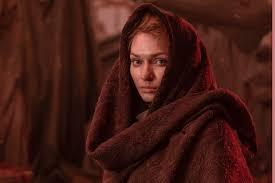
You know, people often ask me why I get so angry when I’m reviewing BBC shows. I mean yes I give Disney and Marvel a hard time too, but they don’t get nearly as much bile and venom as I give the BBC. Well that’s because, unlike Disney and Marvel, BBC shows are funded by the British taxpayer through our TV licence fees. I’m effectively paying for them to make this crap. That’s what pisses me off more than anything.
Yes we mercifully come to the end of this... this. Episode 1 was a slow, plodding and utterly tedious affair that was about as exciting as an Amish bachelor party. Episode 2 was even worse thanks to its poor narrative structure, terrible characterisation and less than subtle allegories. Now Harness has come to hammer the final nail in the coffin with Episode 3. Is it bad?
...
You’re right, that’s a stupid question. A more apt question would be how bad is it. Very, very bad is the answer. Very, very bad indeed.
Lets start with the obvious problem. The non-linear narrative introduced in the previous episode. The stupid early reveal that the Martians ultimately lose and that Amy survives completely destroyed any and all tension and suspense thanks to Peter Harness desperately trying to outwit the audience instead of just telling a story. Now, bizarrely, he tries to reintroduce tension by having the characters umming and arghing about what killed the Martians off and whether this could help stop the Earth from terraforming. One teeny, tiny problem with this though. The audience already know! Even those that never read the original book know how it ended! And even if you didn’t, the episode drops enough hints like great fucking boulders. The prevalence of typhoid throughout the episode and its correlation with the Martians stumbling around like a drunken prom date isn’t exactly hard to miss. Harness’ writing is still as unsubtle as ever. But worse still, he completely undermines and misses the point of the ending to War Of The Worlds.
One of my biggest pet peeves is when people (mostly Americans) criticise the end of the original book for being a deus ex machina. I mean the Martians get killed off by the common cold. How stupid, right? Except it’s not because those people (mostly Americans) are looking at it the wrong way. Your main takeaway shouldn’t be that the Martians were easily killed off by bacteria. Rather that we failed to stop them. The reason humanity prevails in the end is more down to luck than anything else. The narrator even attributes this to being an act of God. But here’s the thing. We didn’t stand a chance against the Martians. We didn’t beat them. They lost because they just happened to catch a cold. Now it’s not hard to imagine a society as scientifically advanced as their’s to be able to find some kind of cure or vaccine for it. And if and when they do, what then? We’d be fucked, wouldn’t we? Should the Martians ever return to finish what they started, the human race would be well and truly doomed. It’s not a deus ex machina. It’s a dire warning of what’s to come. A brief respite before the inevitable. That’s what makes the ending so effective.
The BBC series however completely misunderstands this, changing the story so that Ogilvy (an astronomer, don’t forget) somehow manages to weaponize typhoid in order to kill the red weed, which is presented as some kind of victory, when in reality it’s quite an insulting deviation from the source material. If only the Commonwealth could shake off the remnants of British colonialism as easily as these guys dealt with the red weed. Not to mention it just makes the Martians look really stupid. So they come to Earth, drink our blood, keel over and then... what, they just give up? Are they just waiting for humanity to die by itself? What happens when Mars HQ realises the red weed hasn’t worked? What then? Are they just going to shrug it off? It doesn’t make any sense.

Which brings us to the Martians themselves. The picture above comes from the Jeff Wayne musical version and is without a doubt the most accurate depiction of the Martians from the book. Most of the other adaptations have wildly different interpretations, which isn’t a problem in and of itself provided it works within the context of that particular narrative. However the reason I bring up the original design is so I can talk about what H.G. Wells intended when he came up with them. See, while the Martians are highly intelligent, they’re also presented as being quite vestigial. They’re sluggish thanks to Earth’s heavier gravity, rendered practically deaf thanks to Earth’s dense atmosphere and apparently have no organs with which to digest their food, hence their need to inject human blood directly into themselves for sustenance. The Martians represent what humanity could become as we become more and more reliant on technology. The Industrial Revolution brought about a lot of societal fears and concerns at the time, and the Martians are those fears manifested. Heartless creatures reduced to being simple brains, unable to properly interact with the world around them.
The BBC series goes a very different route. Instead of the giant brains, we instead get giant brown crabs, which, again, isn’t necessarily a problem provided it works in context. And that’s the problem. It doesn’t. The original Wells design told us what we needed to know about their biology, their motivations and their society. What do we learn about the BBC Martians? They’re big, generic monsters that look like rejects from Stranger Things. They don’t even inject blood into themselves. They feed off of us directly, leechlike. They’re more like animals. Not the vast, cold, unsympathetic intellects they were described to be. At no point do you buy that these creatures would be capable of building the Tripods or colonising the Earth. They just exist for some cheap jump scares and horror movie cliches.
What’s worse is that by changing the Martians’ design so drastically, any subtextual allegory gets chucked in the bin. The Martians from the book are meant to represent the British Empire at the height of its power. Merciless tyrants stomping all over the lives and cultures of the so called ‘lesser races,’ changing the environment to suit them rather than adapting to the existing environment. It’s Darwinism crossed with arrogance. And yet, ironically, the oppressors (the Martians) are technically inferior to the natives (the humans) as they are incapable of surviving without the aid of technology. The BBC series is unable to make this allegory, so Harness has to resort to straight up telling the audience the allegory. In by far the clunkiest scene in the entire series, we see George argue with his brother about how the Martians are no different from the Brits in their colonial ways. Not only does this break the ‘show, don’t tell’ rule and stands as a perfect example of bad storytelling, Harness doesn’t even bother to do anything with this other than just making the comparison. It’s been previously established that Amy was born and raised in India. You’d think she’d have something to say about all this, but nope. At the end, she wistfully describes India to her son in the most patronising and insulting way possible. It’s really quite disgusting. I mean H.G. Wells was quite patronising towards the Tasmanians in the book, but in his defence, he was a privileged white man from the 1800s. What’s Peter Harness’ excuse?! Ostensibly he pays lip service to the idea that the Martians are no different from the Brits, but he doesn’t want to really explore it or get us to actually think about it. Probably because it’s all a bit too complicated to get into, but if he’s not confident about exploring such topics, why the fuck is he adapting War Of The Worlds in the first bloody place?! Write something else!
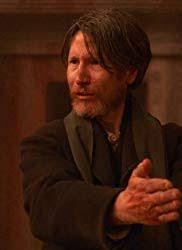
In fact I think this is the root of all the problems with this adaptation. Harness clearly isn’t capable of exploring the complex themes of the source material, so instead he either introduces irrelevant social issues that aren’t nearly as complicated (women’s rights, empires are bad and so on) as a token show of progressiveness, or he goes as far as to uncomplicate themes and ideas to an almost offensive degree. In the book, the narrator is trapped in a church with a priest who is going through a major existential crisis and risks giving away their hiding spot to the Martians, who are busy terraforming the planet. So he resorts to knocking the priest unconscious and watching as the Martians drag his body away. In the BBC series, we see the old woman and the kid get killed off for no reason other than shock value and the characters have nothing to do with their demise, so they’re morally in the clear. The priest meanwhile doesn’t even appear in the scene, instead being relegated to the shitty flash forwards where his faith remains very much intact and even protests against the idea that it’s humanity’s illness that stopped the Martians rather than an act of God (brief side note, would Ogilvy really be this open about not believing in God? At the time of the book’s publication, the scene with the priest losing faith was considered extremely controversial, so this just seems utterly wrong). Plus there’s no tension in wondering what the Martians are doing and whether they’re going to find the characters. In fact there’s no tension whatsoever because we know the Martians have fallen ill and the characters are just hanging around, waiting for the fuckers to die. I cannot stress enough how atrociously awful the writing is in this show. We know the Martians are dying and the episode is about the characters waiting for them to die.
Jesus fucking Christ!
The Artilleryman from the previous episode was the same. In the book he was a deluded crackpot who willingly bought into imperialist dogma, believing that humanity could rebuild underground and eventually rise up and defeat the Martians. In the BBC series, he was a scared, innocent little waif being forced to fight in a war he wants no part of. It’s an incredibly shallow and uninteresting reinterpretation of the source material.
But the worst, the absolute worst, is what Harness does with George.

To be clear, no I’m not upset he gets killed off. I’ve made my views on him quite clear. He cheated on his wife because she was infertile and ran off to make whoopie with some redhead. The bastard deserves everything he gets, frankly. Plus I’ve had enough of Rafe Spall’s gormless acting to last a lifetime, thank you. What I am upset by is the way he gets killed off.
One of the most interesting parts of the original book is the fact that there are no heroes in War Of The Worlds. The Artilleryman is a young, impressionable, nationalist fool, the Priest descends into a pit of nihilistic despair, and the narrator survives only by his cowardice. He even goes as far as to attempt suicide, throwing himself in front of the unbeknownst to him dead Tripod because he cannot bear the idea of living in a world like this. It’s extremely dark and very cynical. The BBC series goes a very different route. We see George slowly become delirious as a result of the typhoid infection he got by drinking the poisoned cup of water in the previous episode (so all that stuff about the Martian terraforming was a load of bollocks) before, realising that he is becoming a burden to Amy, deciding to make the supreme sacrifice and facing the lone Martian alone while she makes a run for it. Not only does this open up a major plot hole - who the fuck was Amy expecting to arrive from the North if George is dead? They try to dismiss this as memory suppression, but I’m pretty sure that doesn’t apply to losing a loved one to a fucking alien - it also completely stands at odds with the themes of the book. When facing annihilation at the hands of a higher power, the arrogant Brits, who previously lived a life of privilege on the backs of millions of subjugated, reveal themselves for who they truly are at their core. The BBC series says yeah, we were a bunch of racist tosspots with delusions of grandeur, but we weren’t all bad. The main takeaway I got from this despicable, badly written series was a three hour pity party about how all those selfish POCs don’t consider the feelings of white people and asking why can’t we all just get along.
Peter Harness’ bastardisation of War Of The Worlds is without a doubt one of the worst adaptations I’ve ever seen. In fact it’s quite possibly one of the worst TV shows I’ve ever seen, period. It’s not just the sheer disregard for the source material that upsets me. It’s also the absolute amateurish nature of the whole fucking thing. This series fails in some of the most basic ways. His writing is truly terrible, somehow getting steadily worse and worse with each episode. It’s not just upsetting to see someone get the fundamental elements of storytelling so spectacularly wrong, it honestly makes me sick to my fucking stomach. Peter Harness, please, for your own sake and my sanity, stop fucking writing. You’re clearly not good at it and I don’t want to see my money go to someone who obviously hasn’t the faintest fucking idea what they’re doing. Enough is enough.
So it would seem that Jeff Wayne’s musical version remains the best adaptation of War Of The Worlds. In fact can we just have a movie adaptation of that please?
29 notes
·
View notes
Text
Planning A Novel
disclaimer: I know that there are a million ways of planning a novel, this is just some tips on how I planned ‘finding hallie’
FINDING INSPIRATION
finding inspiration of a novel is often one of the hardest parts because you need to find the idea that sparks you novel. here’s some ways to help find that spark
consume a lot of art. whether it be other novels, actual art, films, tv shows, music, the more you watch and emerge yourself in the creative world the more likely it is that you will discover your own story
scroll through the internet. similarly I find scrolling through writing communities online whether that be on tumblr, youtube, blogs is so helpful in finding direct advice but also reading other people talk about their own stories will really spark ideas in your brain
people watch. no seriously. other people will always provide new inspiration for characters
write down all your ideas. if you write everything down you will be able to connect ideas and thoughts until you find the one amongst the madness
think about what you’re passionate about. if you know what you want to write about - whether this be some themes or genre or character or plot - you need to make sure this is something you are passionate about so that you will have the motivation to write the novel
think about your life and experiences. I don't necessarily mean write your own personal story exactly but take ideas, themes, feelings from your own life and make them more dramatic, connect them together, play around with them until you find your new novel
CREATING CHARACTERS
so once I've got a rough idea in my head and I've jotted done some rough plot points I start working on building my characters. I tend to write contemporary ya fiction so a strong character base is really important for me but other genres might require more world building first
form an image of your character in your mind. this doesn't have to be physical or precise just try and get to grips with who your character is - no details required - just imagine them
figure out names. this is own of my favourite aspects of planning a novel, honestly, my internet search makes me look like a pregnant mother to be the amount of baby name sites I go on. but baby name sites are so useful and the majority of them will have specific lists for different types of names or you can google lists for names from other eras / places to ensure that the name fits the character. you don't won't a grandma to be called something very modern like Brittany or to choose a name with strong heritage and origins but then not have that link to your actual character. also search for meanings of names, they don't have to always match up to your character but its best not to have a name that means the complete opposite to their personality - unless this is your desired effect
create a character chart. this is where your character comes to life. my favourite of these charts is this one because there’s so many questions (feel free to only answer some of them, sometimes not everything is relevant). these charts transform just a name and an idea into a fully fleshed out character and in doing so can help you with plotting their motivations and actions. it also helps to keep a record of this chart so that when you get around to writing you don't make continuity eras
create minor characters. once you have the main characters and there families you need to create friends and acquaintances - think teachers, colleagues, people who they see everyday. some of these will merely need names, some might also need a little personality descriptor. it isn't necessary to make an entire character chart but I would advise keep a track of their names and any traits that you decide upon which you can add to once you start writing to avoid continuity errors.
DETAILS
after character creation, it’s time to decide on the details of your novel and the context that the story occurs in. this can be relatively quick if you’re writing a novel set in the present day, in the real world, but with any new setting or different time period, this can become the most crucial step of planning your novel.
setting is always a good place to start. for me this doesn't take long as I prefer to write stories set in a contemporary setting and hence the worldbuliding stage doesn't require a lot of time or imagination. but you still have to decide on main locations: school, home, towns. you can map things out or you can use places you already know
all these locations need names. deciding on names for the main settings of your novel really makes the story come to life and feel real. for towns I like to look up some common prefixes and suffixes of real towns and then mix and match them to create something new. for schools, think about the names of schools you already know for instance my high school was merely named after the town so that reflects in my novel.
I wish I could talk about world building. but I know that I am not the best person to turn to for advice go check out blogs with a more fantasy based style for detailed tips on creating new worlds for your novel.
think about your characters. how old are they? what school year are they in? what would be going on in their lives at this point? don't write a story with 16 year old characters who don't face exams or start your story in the summer and keep them at school without any holiday. figure out the time that your story should be set and the context that that means your characters are living in.
OUTLINING now you have any idea, a rough plot, characters and a setting, it’s time for the final stage of planning: outlining. this isn't something that everyone likes to do but I find it really useful for keeping my story on track and knowing where I'm heading. you can do this in as little or as much detail as you like, it’s up to you.
start small. I like to blurt all my ideas out onto the page in a somewhat logical order before I have any of the details in there. this means I have the important points, the big twists and turns and the events that I know must happen.
connect the dots. now you have the big picture set, its time to get into the details of how you get from A - B. for me this always helps to make sure the story makes sense and flows and prevents me from starting to write and then struggling to figure out how to actually get my character to the point of the next moment.
gradually get bigger. I continue this process until I have a full storyline planned out by just adding more points in and then connecting the smaller dots together. this way I have the details of the plot sorted before I begin to write.
plan your chapters. I then try and organise this broad points into paragraphs and decide exactly when each one will appear and how much space it will take up in the narrative as well as how I will tell it. if you have multiple POVs this is a good time to assign the plot points to the characters. this doesn't have to be in mass detail, I like to leave a bit of ambiguity in my plan so that the writing process remains fun and exciting.
TIME TO WRITE
now you’ve planned out your novel, it’s time to write. you don't have to always stay rigidly attached to your plan, let your characters control their own story if necessary but remember to update your plan after any changes to avoid coming across big issues later on.
I hope this was useful, if you want me to do a similar post on my writing and editing processes please like and reblog, thank you
#planning a novel#planning#planner#novel#writer#writeblr#advice#writer advice#writing#writers on tumblr#writing community
136 notes
·
View notes
Note
Do you have any writing tips for someone that is definitely not a writer but wants to be better at writing anyway? That might be too vague so I'll say this, I have a lot of trouble getting an idea that isn't either something really small that doesn't make a narrative or something gigantic and complicated that I dont have the will to take on. No middle sliders in my life.
You have an issue my boyfriend has, he has great ideas but either believes they’re just something too small for a long narrative or so long and complex he doesn’t know how to plot them.
I can’t tell you what the right way is, because everyone is different of course, but I think there’s two ways you can go about it to try and figure out which might help you best.
First of all, take notes on every idea you have. I’m serious. However small it seems, just write it down. Even if it’s something as trivial as ‘man eats an apple while staring at a tree’, whatever. I find that, when something really tiny like that pops into my head with that thing of ‘dang, I need to write this’ but it just seems way too trivial for me to care, it’s because of how I’m visualizing it. I’ll tell you this, this one time I was having a cup of coffee near the library after a break and I saw this woman in the gardens looking at a tree, and that’s what gripped me in that moment. It was really stupid, but the thing I saw was what made me explore that for some reason. I thought she looked sad, I don’t know why, it just looked really sad, and it looked like that sad woman just casually looked up at a cypress tree like she wanted to see something pretty on a shitty day. Later on, must have been years, I was trying to write a scene where a character was supposed to compose a text for school about why she mattered and the only thing that came to mind was that woman looking up at that tree. I’m telling you this because the littlest thing can really help. If you get that unexpected pang of ‘damn, this is cool’ or ‘wow, this is really pretty’, take the chance to write down the what and why at least. Because you never know!
Now, as for development, there’s two ways to go about it that might help you. You can explore the character-driven side of narrative, or the plot-driven. These are, I’ll be honest, two things I have a hard time distinguishing but I mostly follow character-driven.
Plot-driven stuff generally has people planning beforehand (hence why I suck at it lmao). Some people follow the 3 Act structure, or other ways to go about it with planning (this is a good place to check out a few). As the name says, the plot is the star. There is a narrative you want to develop. There’s a central plot with probably very little sub-plots, but that one plot is the main goal. Most likely, one protagonist or two, both with goals that they will achieve or not at the end.
Character-driven, though... the characters make the story. It’s really hard to explain, so I’ll explain how I do it. I essentially have to have the characters very well established. Who they are, psychologically. Once I know them, I let the story flow naturally.
This has helped me a lot because most of the times I have a premise, not a plot, and on my first draft (not even a first draft, more like preliminary exercise lmao), I just try that approach to try and understand who these characters are or what I want them to be, so that they can move the story. Eventually, what happens is I have the inciting incident settled, the lowpoint as well or just something in the middle that is a plot device, and the ending established, but as I progress, since I know the characters, new things emerge like, completely new conflicts and reactions that just occur to me as I progress. But this is my method, it’s how I work.
For me, personally, sitting down just TRYING to find a plot, or an extra for the already existing plot, is tiresome and it drains me. So I just go ahead and do something and see where it goes. I follow the character instead of the plot (ask stuff like “what would she do if a stranger bumped into her on the subway, what should do if she witnessed this or that, what would she say if someone asked her this and that”, and go from there).
Another thing is: find your voice. I mean mostly style. I find that most of the times people struggle with this because they are struggling with finding their style, because once you get your voice established it might become easier in developing your story. For example, I always loved bullshitting my way through stuff if it involves words lmao, and when it came to creating long stories, I had an issue with planning. I remember at school my teachers would have us write a detailed plan of our story before the actual story, and we were forced to turn them both in for grading, which fucking sucked, because I don’t plan.
Then I read Virginia Woolf and learned about this neat little thing called ‘stream of consciousness’ and thought, fuck you, 9th grade teacher. Stream of consciousness is essentially a style where the author focuses on one small detail, seemingly trivial, and then develops an entire fluid string of throughs that interconnect with each other however contrasting they are (why the sentence “Mrs. Dalloway thought she’d buy the flowers herself” is so remarkable, because for the WHOLE BOOK, Woolf debates about many things, seldom being flowers. Hell, one of my favourite short stories is her meditating on a fly that lands on a bowl of milk).
So what I learned with this was: bullshitting your way out of purple prose has an academic word for it! Great! This also validated a lot my lack of planning, meaning that every time I drivelled instead of following a step-by-step plot I was actually building something worth a damn, because that exercise of developing a string of thoughts that are born from one shitty thing is something that can happen inside a novel.
So you see, finding my style, in this case, helped me find my voice and it became very easy ever since to juggle my methods with my ideas. This is my experience, of course, and it’s worth what it’s worth, but this little thing is what helped me establish that, I might have an idea, but if I let it flow, it might grow into something.
Of course, there’s that last advice: read more, watch more TV shows and movies within the genre you’d like to explore, etc etc, but I think it always goes without saying.
And one more thing: no story, for me, is too small or too long. It has its own natural length. Sometimes, we have ideas that are naturally shorter. It just means they’re short stories, or novellas, or novelettes. When my boyfriend told me he had that same problem -- that he had ideas he just didn’t know how to develop into full books -- I told him: then they’re short stories. And that’s fantastic.
The thing is, being a writer isn’t like something immutable, you’re not the same always, you know, you’re not always in this place, with this style, writing about this thing. You keep changing, keep finding new voices, keep exploring new angles, just continuously growing, as with any other artistic field. So maybe right now, those might be short stories, but who knows in the future?
I was reading American Gods and Neil Gaiman apparently republished it a second time, a much longer version his former editor had told him to cut down, and at the beginning he quotes Stephen King on why he did it: cause there were small bits in it, sub-plots if you will, editors are keen on thinking they don’t add to the main plot, but they build the story as a whole, paint the colours needed for the setting, the ambience, the narrative outside the main plot, and both authors felt their concepts, their ideas, weren’t complete without them.
My first advice when someone has an idea is always this: write it down, however it is, with whatever you have. It might be one paragraph. It might be 400 pages. Whatever you have, it’s just a first draft, and the goal of a first draft is getting it down on paper, not turning it into the finished work. It’s the first step.
And if it’s gigantic? Make it gigantic. This is Miss Only Writes Gigantic Shit speaking. I mean monstrous. Especially first and second and even like, third and fourth draft (man I have a lot of drafts), it’s so brutally long I seriously have to take a step back and think “bitch, slow down”. Eventually, I chop down stuff. Scenes that don’t add anything, repeated stuff, scenes that establish what is already established -- just stuff that misses the eye.
Just to say, let the story have its natural rhythm in the beginning stages. Writing is like baking, as I say: you need to set it aside and let it settle for a while, and then when you come back to it with a clear head, you’ll be able to compose it better. Eventually, it drives you down misery road and actually have to do the dreadful thing of leaving stuff out -- it’s sad, I won’t deny, looking at this one character and saying “goodbye, you were a good one, but I have to put you into the Unused Character Pile, maybe one day you’ll find your light, but not today, and I’m so sorry, but where you are right now, you’re useless lmao”. It’s a step that comes eventually, but it’s not needed in the early stages.
But in the end, it all comes down to motivation, I think. So first and foremost, I would say... find your motivation to write whatever you have. You could read more into the genre you’re thinking of, or you could try and write small vignettes of the story you have in mind (just pick a scene and try writing it down, just to see). You could try a challenge of sorts, like picking up a concept, a word, a sentence, and try developing it. Create a habit too -- don’t mind that “write every day” stuff, do it whenever you feel like it, whenever you get that tingle of ‘damn I feel like writing’, just answer that call. And always believe in your ideas, and I say this because I find that a lot of lack of motivation comes from ‘my idea sucks’ or ‘it’s been done before’. Your ideas are yours alone, so explore them as much as you can.
I used to have a website saved that I lost and this is the closest thing to it I found, but try this out for like a first plot, or just to generally get an outline of your idea. It has HELPED ME TREMENDOUSLY when I have a new idea that just makes me think “Great! now what the fuck do I do with it?”
I hope this helped, anon!! And sweet, sweet writing, my friend!
5 notes
·
View notes
Text
Last thoughts on Game of Thrones
(probably)
Now that the show is done, and GRRM will probably never finish Book 6, much less finish the series, what are we left with?
I’ve read the five books that are out. I haven’t read the Dunk and Egg stories or any of the “historical” material that GRRM and his enablers have put out. I loved the first book, liked the second and the third, and struggled through the fourth and the fifth. The series as a whole is okay. The show is one of my favorite shows.
My thought after reading A Storm of Swords was that GRRM had broken the narrative so hard (RW, Dany ruling in Essos, Stoneheart) that he had effectively written himself into a corner that he would be hard pressed to get out of. So far I have been proven right: not only has his writing pace slowed considerably but the narrative of the books themselves has ground to a halt. He has deconstructed the tropes of epic fantasy so thoroughly (and in some instances needlessly) that his characters are left to wander through increasingly bleak landscapes and environments with no plot to anchor them. This would, I suppose, work if GRRM was a prose stylist of enough skill to keep me interested regardless of the lack of a plot. Just look at The Essex Serpent by Sarah Perry to see how this can work. But he’s no Tolkien or Erikson, and we are far away from the Tower of Joy, one of the most stylistically rich passages of the first book.
I bring all this up for two reasons: to say (1) I don’t have the same attachment to these books that a lot of my fellow nerds do; and (2) to point out the textual difficulties involved in adapting this material.
(1) means I don’t care that the King of the Iron Islands sits on the Salt Throne instead of the Seastone Chair. I didn’t tally up the differences between the show and the books while I was watching. I was interested in the world and the characters but what I really wanted was good TV and a good story. I got those things.
(2) The show came out right after Book 5 was published. Was GRRM’s plan that he would stay ahead of the show since there would be at least five seasons directly adapting his books before the show got ahead of the books? Until he tells us, we’ll never know. We have since learned that GRRM was in regular consultation with the writers about the structure of the story after Book 5, so I would be very surprised if the major beats in Books 6 and 7 don’t look very similar to the major beats in the show. I’ll eat crow if I’m wrong!
I’ve been thinking about this show in two different frames: 1) Prestige TV and 2) Epic Fantasy. I think these two frames help us understand, or at least help me understand, why the show developed the way that it did.
1) Prestige TV: After The Sopranos ended, HBO badly needed another critically acclaimed, watercooler show that would bring in the ratings. In that respect, Game of Thrones would allow HBO to live up to its original premise-- “it’s not TV! It’s HBO!” and create a show that simply would never air on network TV. Epic Fantasy! Boobs! Dragons! Direwolves! Classically trained British actors! Prestige TV also relies on shock value, and in this sense too the GoT narrative was perfect for HBO. But in another sense the budget GoT required as the narrative expanded and the scale broadened was an outlier; none of the other shows HBO is hyping now, not even His Dark Materials, require the kind of dollars GoT hoovered up (that might change in the third book of HDM). In that context I can see why things got more constrained for the show. 2) Epic Fantasy. But from another perspective I would argue that the accelerated narrative of the final two seasons actually works to the story’s advantage. I think of the show as a whole as a narrative in three parts. Seasons 1-4 are Part One: we’re introduced to all the major players, the two major conflicts (the Iron Throne, the White Walkers) are set in motion, and then a series of deaths in S4 move most of the remaining players beyond Westeros. 5-6 are Part Two: Realignment. The surviving players try to pick up the pieces and create new identities for themselves. By the end of part two, Cersei is (seemingly) on one side and everyone else is on the other. 7-8, Part Three: Conclusion. With the battle lines drawn, all is action. There’s not as much intrigue and conversation because, well, the promise of violence between good guys and bad guys and worse things has to be fulfilled.
There are lots of people right now making parallels between GoT and some period in late medieval and early modern history, because the first book looks like the Wars of the Roses plus Mongols plus dragons, but to me that’s the wrong frame (not the least because GRRM got a lot of his history from weird sources). This is Epic Deconstructionist Fantasy in the modern, Tolkien-esque vein. What does that mean? A lot of modern fantasy falls into one of three categories: 1) Heroic Fantasy (where everything is basically okay at the end; nothing much changes: Harry Potter, Tad Williams) 2) Grimdark (the opposite: Joe Abercrombie, Mark Lawrence) 3) EDF (Tolkien, LeGuin, Zelazny, Erikson) GRRM’s books are largely grimdark - for now. We don’t know how they’ll end. GRRM has teased for years that the seventh book will be nothing but the wind whistling over the graves of the main characters, but there is no way HBO was going to greenlight -that-. The show followed the grimdark trajectory throughout Part One and Two. But after S6 the show couldn’t go that route anymore. It could go Full Heroic Fantasy and crown Jon or Dany or both, or it could go the more interesting route and embrace the EDF narrative. EDF requires that most conventions of the genre be upended and the world be changed substantially. Its endings are usually bittersweet. People we want to be good turn out to be bad, or at least messily human. Dany’s turn towards villainy echoes similar transformations in Tolkien and Keyes (The Kingdoms of Thorn and Bone). Jaime struggles with the better angels of his nature but loses out to his demons (and at the very least keeps Brienne out of King’s Landing) ala Boromir. Jon Snow reminded me profoundly of Ged at the end of The Farthest Shore: “he is done with doing.” Sansa and Arya are free to choose their own paths (like Corwin in Zelazny’s Amber), unburdened of the expectations placed upon them by the patriarchal system -- because with the election of Bran to the kingship, that system has been dealt a mortal blow! Power now rests with a bunch of up-jumped commoners (no, Tyrion and Brienne are not commoners, but they are outsiders in other ways). The ending reminded me of nothing so much as Lloyd Alexander’s The Beggar Queen: a new system is in place, but it might all come crashing down! Hence the ambiguity of Tyrion’s answer to Jon’s question: “ask me again in ten years.” (also, back to point #1 about Prestige TV, if HBO decides to go back to the GoT well, they need the Starks alive and out of the Seven/Six kingdoms) Those are my thoughts. The narrative started as a grimdark fantasy but ended as something significantly different, because its genre allowed for, if not demands, a bittersweet, non-heroic ending. And it worked. For me. It was certainly one of my favorite shows of the last several years.
3 notes
·
View notes
Text
Beccaland reads and responds to an article about Doctor Who that she really should have known better than to have read in the first place
You know how you KNOW you should never read the comments sections, but sometimes you just can’t help yourself? That’s usually how I feel about reading articles about Doctor Who during the past few years, except from a handful of trusted sources. Yet there I was this morning, checking my regular email from Tor.com, and out of a slightly-morbid curiosity, I found myself reading “How It Feels to Want to Watch Doctor Who Again” by Alex Brown.
Partly, I really am interested in the fans who are getting interested in Doctor Who again. They left for a lot of reasons, and really you can’t begrudge anyone’s waning interest in a TV show. And it would be far, far more silly to begrudge them regaining interest! I’m excited for the awesome changes that are coming on October 7th, too. And I am fully aware that not every era is every fan’s cup of tea. On the other hand, I also know that I’m frequently irritated by the shallow criticism levelled in order to “justify” some fans’ disaffection. So there I was. Reading an article I knew very well was probably going to annoy me, like a masochist.
And just because I feel like it, I’m going to quote a bunch of it and offer my own commentary. I’m going to be as fair as I can, noting where I think a given critique is valid, where I think it’s valid but still disagree, and where I think it’s the same old tired, inaccurate nonsense.
Here we go:
“I miss Doctor Who.”
ME TOO!
“There was a time when I watched it fervently, reverently, passionately. It was something I put on when I was stressed or overwhelmed or needed to be reminded of the good things in life. The relationship wasn’t perfect, but it was powerful and affirming.”
Yeah, I do that too, but I never really stopped.
“Until suddenly it wasn’t.”
I mean, sure. Doctor Who did something on a purely personal and emotional level for the author, and then it stopped. That’s totally fair.
This actually happened to me with the novels in the ‘90s–they just weren’t doing enough for me imaginatively or emotionally anymore to justify the challenge of finding them and the expense of buying them. It happens. (I still wanted Doctor Who in my life though, so I rewatched my VHS tapes instead, until they had degraded in quality to the point where that wasn’t very fun either.)
“The show twisted into something unrecognizable and unpleasant. And so I abandoned Doctor Who just as it had abandoned me.”
The really negatively loaded language here bugs me a lot, but this article is a personal fan narrative more than it is a review, and it’s impossible to refute a subjective response. Clearly, it’s true that Alex Brown and the show were no longer on the same wavelength. So, fair enough.
“If you asked me in 2016 if I would ever watch Doctor Who again, I probably would’ve shaken my head and sighed. The chances of the show making the kind of changes necessary to pull me back seemed slim to none. But here we are, fall 2018, and I am so excited about the Season 11 premiere that I can barely stand it.”
I’m really happy about everyone coming back. I share this excitement!
[I’m omitting a couple of paragraphs here where Brown describes more of what Doctor Who meant to her when she first encountered the show during an obviously extremely difficult time in her life. It’s really moving, and I find it relatable in some ways.]
“With the takeover by Steven Moffat in 2010, my relationship with the Doctor shifted dramatically. As much as I loved Doctor Who, I wasn’t blinkered to its myriad problems.”
See, my issue with this is simply that it implies that people like me ARE “blinkered by its myriad problems.” We’re not. But sometimes we disagree about what those problems are, or where the blame (and praise) for those problems (and their amelioration) properly lies. Hence this post.
“Trouble was, the annoying but tolerable issues were magnified into something unbearable by Moffat’s numerous faults as showrunner. Under Moffat, seasons went from episodic romps loosely knitted together by repeating themes—think “Bad Wolf” Easter eggs throughout the first season—to Lost-style mystery box seasons bogged down in an increasingly convoluted and grimdark mythology.”
I think it’s fair to say that the series 6 arc in particular was much heavier than previously attempted by the show, and this was a turnoff for some viewers. Personally, I liked it a lot conceptually, but I acknowledge that it could have been better executed. It’s also not representative of Moffat’s whole era; he experimented a lot with structure. That in itself was probably frustrating to some viewers–again, I liked it a lot, but that’s neither here nor there.
However, calling the Moffat era “grimdark” is frankly bizarre. It seems to confuse a shift in LIGHTING with a shift in TONE. The Moffat era’s TONE was, if anything, substantially more hopepunk than the RTD era (to say nothing of Torchwood, which Brown also professes to adore).
“River Song, Cybermen, Daleks, and the Master work best when used sparingly,”
Yeah, I agree.
“but Moffat dragged them out of the toy box so often that they lost their appeal.”
A criticism that (aside from River, for whom YMMV) applies equally to the RTD era.
“Even the Doctor suffered from too much focus. Doctor Who is a show that flourishes when it cares more about the people the Doctor helps than the Doctor. The Doctor is much more interesting as a character who drops into other people’s stories than when everyone else exists only to serve the Doctor’s narrative.”
This is a matter of taste, and on that level cannot be refuted.
But I’m not actually sure it’s true that the stories in the Moffat era focused more on the Doctor than was the case in previous eras. It didn’t seem that way to me. I suppose one could develop some way of objectively evaluating the validity of that premise, but I’m not going to go to that much trouble.
“Worse, women went from equals with their own vibrant lives to codependent followers.”
This is not merely a matter of personal taste. It is an assertion about content of the sort which could hypothetically be supported by evidence. If it were true. And it is literally the opposite of true. It’s a gross mischaracterization of the Moffat era companions, and moreover ignores the sometimes-problematic characterizations of the RTD era companions. I’m skipping the rest of that paragraph, which merely rehashes worn-out, shallow readings of Amy and Clara’s characters. I have nothing to say about those arguments that I haven’t said elsewhere before.
“[Moffat’s] seeming disdain for how fans interpreted the series,”
Showrunners SHOULD disdain how fans interpret their work. Or, more accurately, they should ignore it. Since fans are a motley bunch, the alternative would be a total lack of creative vision, either deeply bland or utterly fractured.
“for critiques of his own biases and bigotries,”
In reality, Steven Moffat demonstrated a remarkable openness to critiques of his biases and made steady progress in addressing them both in front of the camera and behind the scenes.
“and for the depth the show was capable of became a virus that infected everything.”
From where I sit, Doctor Who demonstrated far more depth during the Moffat era than during the RTD era (and some of the deepest scripts in RTD’s era were written by Moffat and according to RTD, barely touched by his editorial influence). I’m willing to consider the possibility that the RTD era displayed depths that I failed to perceive, but given the number of times I’ve rewatched it and the fact that I study texts for a living, I have to say I think that’s a long shot. I would welcome a persuasive analysis of the depths of the RTD era.
“I have never been one to shy away from dropping shows that I no longer like, but I held onto Doctor Who longer than I should have. I finally tapped out after the frustrating penultimate episode of Season 6, “The Wedding of River Song.” Reductive, repetitive, and boring, the episode encapsulated everything I couldn’t stand about Moffat’s storytelling.”
OK, Brown has got a point there. I love TWORS for purely personal reasons (it was just FUN, in the same way that the more crazy-ambitious failures often are in Doctor Who), but I’m under no illusions about its quality. In addition to being “reductive [and] repetitive” that episode was also rushed and full of holes. I didn’t find it boring, but that’s a subjective thing.
It’s a bit weird though that Brown claims to have quit watching Doctor Who at the end of series 6, since earlier she critiqued both Clara and Moffat’s “over"use of Missy, both of whom post-date Brown’s purported exit. Hmm. Seems like (as is not uncommon, in my experience) people who dislike Moffat base a lot of their dislike on mere hearsay.
"Although Moffat drove me away from Doctor Who, other factors kept me from coming back. A not insignificant chunk of my exhaustion came from the frustratingly limited diversity and the frequently poor treatment of characters of color—see Martha and Bill, plus the weirdness around the few major interracial relationships.”
OK, this is approximately half fair. There WAS a frustrating lack of diversity which continued well into Moffat’s era. Martha and her weird marriage to Mickey are RTD’s doing entirely. And the author claims not to have ever seen series 10, so she’s hardly in a place to evaluate Bill’s treatment (which, for the record, seemed pretty great to me–vastly better than in any previous era, anyway, though there’s no doubt that there is still room for improvement).
“Prior to Season 11 there had never been an Asian or South Asian companion despite the fact that people of South Asian ancestry make up nearly 7% of the population of England and Wales, according to the most recent census. Islam is the second largest religion in the UK, yet Muslims are also largely absent from the show, and certainly from the role of companion.”
This is a totally fair criticism.
“Moffat said it was hard to cast diversely without impinging on historical accuracy,”
Gonna want a citation for that one; I admit it’s possible he said something like that at some point but I feel like I would remember if he had.
“a notion that is patently false and wholly ignorant of actual history.”
A point which Sarah Dollard makes in the series 10 episode “Thin Ice,” with the enthusiastic approval of Moffat himself.
“To be fair, Moffat also admitted this claim was nonsense and rooted in a white-centric view of history and acknowledged that the show needed to do better…then made absolutely no changes.”
Thanks for being fair…almost. In fact he made substantial changes during his tenure, though most happened after Alex Brown quit paying attention. Seems to me that if you’re going to write an article for a blog affiliated with a major SF publisher, you might actually want to check your facts rather than relying on information that’s several years out of date (if it was ever true).
“And don’t even get me started on frequent Moffat collaborator and Who writer Mark Gatiss who infamously whined about diversity initiatives ruining historical accuracy because they cast a Black man as a soldier on an episode about Queen Victoria’s army battling Ice Warriors on Mars.”
Yeah, this I do remember. Ew, Gatiss! What were you thinking?
“Not to mention Moffat’s asinine declarations that we couldn’t have a woman Doctor becausehe 'didn’t feel enough people wanted it’ and 'This isn’t a show exclusively for progressive liberals; this is also for people who voted Brexit.’”
This is also the man who wrote the first-ever gender-changing regeneration (of the Doctor, no less!) in his comedy special, “The Curse of the Fatal Death,” the first female incarnation of a previously male Time Lord (Missy, who turned out to be incredibly popular), and the first official, non-comedy, on-screen gender-changing regeneration scene (the General, in Hell Bent), thus paving the way for even many of those non-liberal, Brexit-voting audiences to accept a female Doctor, and making it virtually impossible for the BBC not to do it without looking like total assholes (though by that point they were totally on board and needed to further persuasion).
But sure, go ahead and cherry-pick a couple of real-but-not-representative Moffat quotes to perpetuate your misogynistic Moffat pseudo-narrative.
[Cutting the rest of that paragraph because it adds nothing to the critique]
“Why can’t we have a trans or disabled companion? Why can’t the Doctor be a queer woman of color?”
These are totally legitimate questions, and we should keep asking them.
“Do you know what it’s like to be told by someone in a position of power that you don’t belong here? That you are an aberration, a glitch in the matrix, that including you would be so inaccurate that it would collapse the narrative structure of a fictional television show that features a frakking alien traveling through time in a police box?”
Yes. I do.
And when you dismissed Amy and Clara as mere sexist stereotypes, mere codependent hangers-on of the Doctor, you re-inflict that wound on me and many other fans, because you’ve been granted a position of power, a platform in the blog of a major international SF publisher.
“Hearing that message all the time from pop culture is hard enough, but to get it from my favorite show was heartbreaking.”
I feel ya, Alex Brown. This needs to continue to be addressed.
But I’ll also remind readers that the Moffat era, despite its still-too-limited representation, gave us more disability representation than any other era of the show up to that point.
“Cut to the Jodie Whittaker announcement in July, 2017. For the first time in years, I watched the Christmas special—live, no less. To give credit where credit is due, Moffat’s swan song exceeded my (very low) expectations and Peter Capaldi was as excellent as I hoped he’d be. Whittaker had almost no screen time, but what she did get left me with a smile a mile wide.
"On top of her pitch-perfect casting, Thirteen will also be joined by three new companions, one a Black man and another a woman of Indian descent. Plus, the Season 11 writers’ room has added a Black woman, white woman, and a man of Indian descent. Several women will also be directing. New showrunner Chris Chibnall proclaimed that the renovated show will tell 'stories that resonate with the world we’re living in now,’ and will 'be the most accessible, inclusive, diverse season’ ever produced.
"These changes go beyond tokenism and into real diversity work. The show isn’t just sticking a woman in the titular role and patting themselves on the back. Diversity can’t just be about quotas. It must be about inclusion and representation in front of and behind the camera. Marginalized people need to be able to tell our own stories and speak directly to our communities. The majority already gets to do that, and now that conversation needs to happen across the board. The show still has a lot of work to do, both in terms of undoing the status quo of harmful tropes and in laying strong groundwork for later casts and crews. Yet, somewhat surprisingly, I feel hopeful for the show’s future.”
I totally agree with these three paragraphs (except I had high expectations of TUAT, which were also exceeded). In fact these paragraphs are a big part of why I felt like this article was worth sharing. I just couldn’t do it without significant reservation.
“And isn’t hope what the show is really all about? Doctor Who is a story about the hope for a better tomorrow, faith in your companions, and trust that you’re doing the right thing. It’s about a hero using their immense powers responsibly and in order to benefit those who need it the most. The Doctor creates space for the marginalized to stand up and speak out, to fight for their rights against those who would silence or sideline them.”
I’m not totally sure that that’s ever really been true before, but it’s an ongoing aspiration that the show keeps moving closer to.
“For too long, that ideal was lost to puzzle boxes, bloated mythology, and trope-y characters”
No it wasn’t. See above.
“but with the appearance of each new Thirteenth Doctor trailer, my hope grows a little more.
"It’s not often that you find your way back to something you loved and lost. At first, Doctor Who was a touchstone during my trials and hardships. Then it became a cornerstone in the foundation of the new life I was building. For a long time I left it encased in a wall, hidden in the basement of my subconscious, untouched and unwanted. Yet here I stand, sledgehammer in hand, putting a hole in that wall. I have set free my love of Doctor Who as Jodie Whittaker cheers me on. October 7 can’t come soon enough.”
This sentiment is really lovely. Welcome back, Alex Brown, and every other fan returning to Doctor Who after an absence of any length and for any reason. It’s shaping up to be a great new era.
Please remember, though, when talking to other fans, that other eras meant as much to some of them as this one means to you, and for similar reasons.
To those who are leaving because of toxic discourse about previous eras making them feel like their presence isn’t welcome and/or participating in fandom right now will only cause them pain: I’m going to miss you. I hope your DVDs and Big Finish and stuff continue to bring you joy. I hope you’ll come back again when it’s safe to do so.
To those who are leaving because they don’t like the idea of a female Doctor and/or two POC companions: BYE BYE! To be honest, nobody will miss you, but nevertheless I hope that eventually you realize how silly and harmful your biases are. When you do, I hope you’ll come back to Doctor Who. And you’ll be welcome.
30 notes
·
View notes
Text
Some thoughts on the notes and comments on this post

pinkestpigglet
This is a really intresting take. I think I personally prefer the right to be weird theme as an asexual neurodivergent person who's constantly being told she makes the groups she belongs to look bad. And like, I'm not allowed to join the military. For a very stupid reason. I don't want to join the military but like chose non violence doesn't apply to me when Id have to fight for the right to chose violence.
This makes a lot of sense! I think this illustrates perfectly why the differences in themes might make one version or the other appeal to different groups. Casual readers/viewers probably will not care about this, but. Well. We aren't on tumblr because we're casual about it.

botanycrewmember
#kudos to op for pushing back against the reading of aziraphale and crowley being 'quirky' instead of downright rebels
#also a huge part of the original work is the constant reference to the cold war
#a&c's rendezvous is constantly being compared to ussr agents meeting with nato agents
#the novel is outright mocking the rigid definitions of Good and Evil
#and A&C are fighting to stop innocent people becoming collateral in a cosmic arms race
#good omens
#uncle terry i miss you neilman is pulling out the teeth you put into your book
I think this is actually a really relevant point to bring up, because Neil Gaiman himself has said in the past that the novel was in 1990 and satire of the cold war, whereas the TV show in 2019, nearly 30 years later, is about much different anxieties. He said that the changes were to make it more about modern concerns about things like large corporations and bureaucracies. This isn't necessarily wrong, but it is different.
This is something that Neil Gaiman seems to like playing with in fiction, the idea of updating things for "modern times." This was a huge theme in American Gods, and it makes a lot of sense how the horsepersons were written in the book when you know Neil Gaiman wrote most of their scenes while Terry Pratchett wrote most of the Aziraphale and Crowley scenes.
This is pretty creative, but I...personally don't really like it that much, because it feels dismissive. I talked about that in this post a while back. (It feels extremely relevant because, for example, Neil Gaiman dismissed Pestilence as not really a big issue anymore...just before the COVID19 pandemic.)
I personally wouldn't say Neil "pulled the teeth" out of the story, although it definitely doesn't bite the same way it did on the topics in the book, it does bite on some new ones (Which I personally am not interested in, hence why the TV show doesn't really do it for me)

These tags from @blursed-disco from the other post about God being a woman are also relevant here
#tbh my main beef with tv!omens is how it waters down any political message the original held
#and making it into an individualistic narrative where god is just RANDOMLY a woman with no repercussions
#and aziraphale and crowley are just RANDOMLY the only supernatural beings capable of thinking creatively or forming attachment
I think you have a very good point about the adaptation shifting into a more individualistic narrative. The book felt very much like setting up a force for change for everyone, where Aziraphale and Crowley are just the first ones brave enough to speak up about how things aren't right, whereas the TV show makes it seem like they're literally the only ones capable of thinking this way.
The scene in the TV show where Crowley offers to run away to the stars with Aziraphale. Oh my lord do I have mixed feelings about that. I gasped when he said that. It's cute. It's sappy. It's heartbreaking. It's poignant. It's so out of character.
Crowley loves the earth. Aziraphale loves the earth. They love sushi and old books and old cars and humans being weird and good and bad and wonderful and horrible all at once. I've talked about this before, but acting like Crowley would be happy in space as long as Aziraphale was there is doing a disservice to the deeply loving and humanist nature of the themes in the original work. This is one thing I'm not gonna say is just my personal preference/appeals to people differently, because objectively Good Omens is about loving and celebrating the earth and humanity. It's going in my basket with "Crowley should have revived the dove" as things that fundamentally change what the story is about.
The TV show does feel a lot more individualistic. Which, as we saw in the first point by someone who prefers the new version, isn't necessarily bad, it's just a different story. Terry Pratchett, from my experience, is much more into writing stories like the book, whereas Neil Gaiman is more into writing stories like the TV series.
I saw a post a while back (which I'm not going to find and reblog because I don't want that OP to feel like I'm being unnecessarily argumentative or critical of their post) that said Good Omens (TV version) is about Crowley and Aziraphale fighting for the right to be harmlessly weird, and that's why it resonates with autistic people a lot
I think this is an analysis of the TV show that has a lot of merit, but I think it also illustrates how the miniseries adaptation very subtly changed the main themes of the original work
In my opinion, and the reason why I gravitated towards the original story, the book's main theme isn't about being "harmlessly weird," but rather choosing love, kindness, and humanity when violence and hostility is expected of you.
This is why the TV show being sort of a workplace or office resonates less with me. GOmens to me has been about soldiers defying orders, not office workers defying to make water cooler talk because their co-workers aren't understanding.
However it's not like the latter isn't a story worth telling and there's a lot of overlap because both are about rejecting conformity and the status quo
However I would quibble that challenge the status quo is not "harmless" and often causes trouble for the people in power.
To me the point of the story is "the people in power need to have trouble caused for them," rather than "we're not causing trouble for you, leave us alone."
I think this is probably, once again, because Terry was there for the book but not the miniseries. He has a way of writing rage-against-the-machine-by-choosing-kindness-and-understanding characters that I don't see in Neil's writing.
For me personally I liked the book but lost interest in the TV show because I grew up in a culture that expected me to honor violence and engage with everyone else with suspicion and not be weak and trusting. And unlearning that to understand other people, learn how to choose kindness and reject the idea that we have to fight took a lot to unlearn that brainwashing.
I hope people gravitating towards the TV show are having their own journeys with it ☺️
243 notes
·
View notes
Text


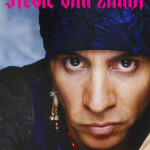
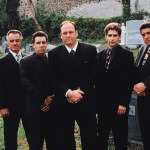

Steven Van Zandt explores his fascinating and unlikely life
NEW YORK
About halfway through Steven Van Zandt's new memoir comes the point of no return.
That moment was in 1983, during the recording of Bruce Springsteen’s breakthrough album “Born in the USA.” Van Zandt, the bandanna-wearing guitarist for Springsteen’s E Street Band, had a fight with The Boss. And then he walked away. On the cusp of the big time.
“Leaving the E Street Band when I did, ended my life as I knew it,” Van Zandt tells The Associated Press in a recent interview. “You can’t be reborn until you die. So that had to happen.”
Van Zandt would go on to remarkable things. He became a solo artist, an outspoken voice for the oppressed around the world, a music educator and a radio host who found a second act as an actor on such TV shows as “The Sopranos” and “Lilyhammer.”
But he still looks back on that temporary break — Springsteen and Van Zandt would eventually reconcile — as a key turning point. In his book, “Unrequited Infatuations,” he calls it “the big mistake of my life” and “my very public career suicide.”
“In the end, you come to the same conclusion, which is: I wish I could have done both. I wish I could have stayed in the band and done all of these things,” he says. “But that’s not really realistic.”
Like its author, “Unrequited Infatuations” from Hachette Books is unassuming, smart, funny and honest, sometime brutally so. Van Zandt covers his life chronologically and also fills the book with the history of rock, his vision for a better world and advice for fledgling rockers.
“My narrative, which is kind of weaving its way through, is the least important part of it to me,” he says. “I didn’t need to confess anything. If I could find a way for it to be useful, I thought then it’s worth writing.”
Readers get a chance to explore all the different parts of the peripatetic Van Zandt, who produces and writes for other musicians, reunites rock pioneers like The Rascals, fights for the LGBT community in North Carolina and shows up on one of the most important TV shows of the 20th century.
It turned out that playing mob consigliere and strip club owner Silvio Dante on “The Sopranos” was a natural fit. He played the same role in the E Street Band, the guy with the good advice who doesn't want the spotlight. Both were sort of faithful underbosses.
“Before you know it, I’m playing that role that I have, in fact, played in real life,” he says. “Somebody has to be that guy in order for a family or a band or anything else to actually function properly. It ended up, very, very natural. And I think that’s why it worked so well.”
Ben Greenman, a novelist and journalist who has collaborated with such musicians as Questlove, George Clinton, Brian Wilson and Gene Simmons, said editing Van Zandt's book was endlessly fascinating since stories had a tendency to tumble out during their regular calls.
“I think the book is a real accurate reflection of the person — there’s plenty of humor and excitement and vivid writing and cameos,” he said. “A good rule of thumb is if it’s this fun to work on, it’s probably this fun to read.”
While building a portrait of one New Jersey artist, another emerges — that of Springsteen himself. To anyone who thinks The Boss' current persona as a working-class hero standing up against a rigged system was always there, think again.
Van Zandt explores a U-turn Springsteen made between “Born to Run” and “Darkness of the Edge of Town,” when his identity flipped from a rebel leaving town to conquer the big city into a rural, stand-and-fight balladeer.
“He completely, 180 degrees changed his identity. He’s fronting, he’s playing a character,” says Van Zandt. "That was the most important moment of his life, because he stayed in that persona forever.”
Van Zandt sent Springsteen the manuscript before publication and he suggested no changes. “He was in the book more than I planned on him being in the book because he turns out he’s a very big part of my life, you know?” Van Zandt says.
After his break with The Boss, Van Zandt made perhaps his biggest global statement when he spearheaded a cultural boycott of South Africa, forming Artists United Against Apartheid in the mid-1980s and writing the anti-apartheid anthem, “Sun City,” which shamed artists who performed in South Africa while Nelson Mandela was jailed.
“Would Mandela have gotten out of jail? Would the South African government have fallen? Probably. But we took years off both of those things,” Van Zandt writes.
Told that bringing a hateful regime to its knees was probably better than playing guitar in a band and Van Zandt laughs. “That’s not a career,” he says. “It don’t pay the bills, you know? And Nelson never offered to pay my rent.”
Van Zandt often found frustration without the comfort of the E Street Band. There is a shelf worth of albums he helped make — from a punk album to a musical theater show for Meat Loaf — that flopped or were shelved. A constant refrain in the book's second half is: “Nobody heard it.”
Another career as an actor in “The Sopranos” and “Lilyhammer” blossomed but there is a wistfulness that his solo music never caught on: “The third career, if you will, as an artist, really never found its audience, not yet anyway. Hence the title.”
Along the way, he throws shade at Paul Simon, Frank Zappa and Whitney Houston, while sharing how he became political and his rules for the best cover songs, nominating “You Keep Me Hanging On” by Vanilla Fudge as the best attempt.
It's all punctuated with advice from someone who's been on top and down low. “As soon as you can afford it, get separate rooms,” he advises new bands. To the main songwriters, “share a bit of the publishing money. It won’t kill you,” he writes. Perhaps the biggest pieces of advice: get a manager, something Van Zandt never did and still rues.
“It really did serve as some kind of a bit of therapy,” he says of the writing his memoir. “It’s always painful going through the mistakes and saying, ‘I wish I could have done this. I could have done that.’”
0 notes
Text
TV’s Most Confusing Episodes From Doctor Who to Westworld
https://ift.tt/2WAmL4r
There has to be some confusion in a TV drama, a procession of things not-yet-understood. That’s the deal: accept temporary bafflement in the expectation that at some point, all will be revealed. Or even if it won’t be, at least there’s a reason it’s been left unsolved, like a Sudoku you’ve got jam on.
Read more
TV
Enough, Scrappy-Doo! The TV Dogs Who Need to Chill the F Out
By Alec Bojalad and 3 others
TV
TV’s Most Stressful Episodes From Battlestar Galactica to The Handmaid’s Tale
By Alec Bojalad and 2 others
What doesn’t work is when a TV show that’s supposed to be taking you along with it, leaves you behind. That could be your fault (Did you stay awake? Skip an episode? Were you checking your phone? Was your dog doing that weird thing with the curtains so you had to get up and miss a bit?). Or it could be the fault of a TV show either too ambitious or inaccessible or illogical for comfort. We’ve chosen the episodes that left us scratching our heads; you can judge who’s to blame.
Doctor Who ‘Twice Upon a Time’ (2017)
So named because twice is the minimum number of times you have to watch the 2017 Doctor Who Christmas special before you have the weakest grasp of what’s going on. Considering that most will have only watched it once, and that, from inside a boozy, gravy-based fug, it’s staggering how esoteric this one is – impressively so. As showrunner Steven Moffat’s farewell episode, it’s a distillation of the sort of clever, complicated, ambitious, self-referential writing he’s known for.
There are two Doctors (three if you count the post-Regeneration glimpse of Thirteen), two overlapping Doctor Who stories, a Dalek, an ancestor of The Brigadier, a ship’s pilot made of glass, a moving historical WWI moment and three companions who aren’t really there. (Or are they?) It’s about regret, or reminiscence, or saying goodbye. It’s definitely about something and is doubtless very meaningful and poignant once you crack its shell, but there’s the sense that, unless you’re one of the Who hardcore, it doesn’t really care for you to try. Why be so aloof? It’s Christmas. Let the rest of us play too. LM
Crazy Ex-Girlfriend Season 4 Episode 8 ‘I’m Not the Person I Used to Be’
This was a bold move from a bold show. When Santino Fontana chose to leave Crazy Ex-Girlfriend after his one year contract ended, the character of Greg – assumed by many to be lead Rebecca’s romantic endgame – was written out in early season two. Then in the fourth and final season, Greg returned but this time played by Skylar Astin. Instead of glossing over the casting change and pretending as though nothing had happened (like when, say, Ross’ ex-wife Carol on Friends or mercenary warrior Daario Naharis on Game of Thrones changed faces), Crazy Ex-Girlfriend hit it straight on.
This smart, innovative series had always been filtered through the unreliable perspective of lead Rebecca Bunch (hence the extravagant musical numbers that take place in her head). So when Greg’s character was recast, the show used it to comment on our impressions of other people. ‘I’m Not the Person I Used to Be’ lampshaded New Greg with a psychoanalytical reflection on changing perceptions and personal growth. It was brave. It was innovative. It was admirable. It was… really confusing and distancing. However great Astin was in the role, and however clever the idea was, New Greg was the point at which some Crazy Ex-Girlfriend fans began to peel away from a show clearly unafraid to leave viewers behind. LM
Westworld Season 3 Episode 8 ‘Crisis Theory’
The Westworld season one finale was confusing in a delicious, grinning ‘Oh, you clever devil’ kind of way. The Westworld season two finale was confusing in an exhilarating ‘Blimey. All right then!’ kind of way. The Westworld season three finale was confusing in a way that made you feel like you’d watched the entire Terminator trilogy on fast-forward while downing a 12-pack of Red Bull and trying to rewire the electrics in your house. It wasn’t a good feeling.
I still don’t know which world-dominating AI was which, who was fighting who, what the evil French guy wanted, how many people were secretly Dolores, whether Maeve still only existed in the Matrix, and why Jesse from Breaking Bad was the new Jesus. If free will still exists by the time season four comes, I’m using mine to either get a valium prescription or change channels. LM
Rick and Morty Season 4 Episode 6 ‘Never Ricking Morty’
“Never Ricking Morty” is a particularly divisive episode of Rick and Morty – even at this very website! Some of us loved it, while others weren’t big fans. One thing that’s undeniable, however, is that this midseason 4 episode is the show’s most complicated narrative endeavor yet. “Never Ricking Morty” takes place on a “Story Train,” meaning that the plot initially goes through your typical three-act storytelling structure.
Once Rick and Morty realize where they are, however, Rick understands that the only way out of the Story Train is to reject the conventions of storytelling altogether. This means that any natural storytelling inclination must be resisted. It also means that the show burns through about nine series finales worth of epic nonsense right at the end as Rick and Morty’s “canon” is sucked right out of them. It’s tremendously challenging to watch, much less understand, and the episode wants it that way. – AB
Russian Doll Episode 7 ‘The Way Out’
Like many other Groundhog Day-style “time loop” stories, Netflix’s Russian Doll goes out of its way to establish the “rules” of its sci-fi premise. Every time Nadia Vulvokov (Natasha Lyonne) dies (which happens with disturbing frequency), she returns to the night of her 36th birthday party, washing her face in the bathroom as Harry Nilsson’s “Gotta Get Up” plays. That much is easy to understand, and Russian Doll has fun seeing how far it can make Nadia last before perishing and returning to the night in question.
Once she meets another person stuck in a time loop, however, things start to get wacky. Russian Doll’s seventh episode, “The Way Out,” is about as off-the-wall an experience as you’ll find on television. Nadia’s loved ones start to disappear. Then she flashes back to memories of her mother. Before you know it, teeth are bloodily falling out. Russian Doll settles in for a relatively logical ending in its eighth episode, but this penultimate installment is pleasantly incomprehensible. – AB
The Nevers Episode 6 ‘True’
The Nevers’ premise is bold enough to begin with. The HBO series is set in a fictional Victorian era where a select portion of the population (most of them women) have been “Touched” or blessed with supernatural abilities. Apparently, however, bold wasn’t nearly bold enough. The Nevers’ sixth episode, which serves as a de facto season finale due to a COVID production delay, upends everything.
Read more
TV
Sky Atlantic’s The Nevers Proves That Good Things Come to Those Who Wait
By Lacy Baugher
TV
The Nevers Part 1 Finale Is The Most Surprising Hour of TV in a Long Time
By Alec Bojalad
This episode begins not in 19th century London like every other installment thus far, but in a far flung dystopian sci-fi future. Earth is barely habitable and humanity is on the ropes. The only possible hope that the human race has left is in the form of a powerful alien species known as the Galanthi. If this all sounds complicated, you don’t even know the half of it. “True” is notable for not holding the audience’s hand through this disorienting experience at all. The episode makes no attempt to tone down its futuristic jargon and it’s not entirely clear what’s even happening until halfway through. By episode’s end, it’s apparent how “True” connects to The Nevers’ original concept, but no one would be blamed for needing multiple rewatches to really get it. – AB
Farscape Season 4 Episode 7 ‘John Quixote’
Let it never be said that Farscape was a TV show afraid to take a big creative swing. In season 4, we get this trippy and confusing episode (written by series star Ben Browder), which sees Crichton and Chiana trapped in a virtual reality game based on the memories of Black-T Crichton (because, yes, this was after the storyline that saw the show’s main character split into two, equally valid humans) and a neural template from Stark. The game is designed to keep C & C trapped in the gameworld until they die so their consciousnesses will be trapped in the virtual reality—wait for it—forever.
This hour of TV actually holds up quite well upon rewatch, probably because it is packed to the brim with clever pop culture references, but an initial watch of this series installment is absolutely bonkers, featuring Aeryn as a southern belle, Rygel as a version of Monty Python’s Black Knight who can shoot fire out of his ass, and D’Argo as a lederhosen-wearing Hansel who, at one point, eats baked beans out of Jool’s intestines. I can only imagine what someone watching this episode out of context would imagine this show is actually about. – KB
Fringe Season 2 Episode 11 ‘Unearthed’
Some episodes of television intentionally challenge the viewer’s ability to interpret what the hell is going on, and some episodes of television are broadcast wildly out of order, seemingly bringing back a character killed off in the previous season for a humdrum monster-of-the-week installment. You may have guessed that I have a specific example in mind for that second category and, if so, you would be right. Written and filmed to be the 21st episode of Fringe’s first season, “Unearthed” was instead recycled to be a mid-season installment in the second season of Fox’s usually pretty great sci-fi drama.
cnx.cmd.push(function() { cnx({ playerId: "106e33c0-3911-473c-b599-b1426db57530", }).render("0270c398a82f44f49c23c16122516796"); });
This might have worked—it’s a basic episode that sees the Fringe team exploring the mystery of a teen girl who is pronounced dead, only to wake up screaming an alphanumeric code while doctors are working to remove her organs—save for the fact that it features a Fringe team member who was killed at the end of the previous season. Honestly, I can laugh about this now, but, at the time, it was jarring and confusing, with the network (Fox, if you were wondering) offering no pre-episode or in-episode explanation offered for why the aforementioned deceased character might be up and walking. For this to happen in an episode that also features a guest character thought dead revealed to be alive is icing on the cake. – KB
The OA Episode 8 ‘Invisible Self’
The OA is one of the most aggressively bizarre shows in Netflix history. Created by and starring Brit Marling, this two-season sci-fi series is fit to bursting with strange, at times difficult-to-comprehend concepts. The storyfollows Marling as Prairie Johnson, a young woman who resurfaces after disappearing – only now she refers to herself as “The OA (or original angel)”. Prairie/The OA recruits several disciples who she promises to take to another dimension. In “Invisible Self”, the final episode of the show’s first season, it all somehow culminates into…well, into this:
Yes, what you’re seeing there is a group full of cult weirdos engaging in an interpretive dance to stop a school shooter. And mostly succeeding! The OA‘s second season gets even stranger in many respects but it’s hard to top the confusing majesty of this first season finale.
Twin Peaks: The Return ‘Part 8’
Legendary filmmaker David Lynch has absolutely no concerns about being dubbed “confusing.” In fact, when it comes to Lynch’s filmography, that’s kind of a feature, not a bug. In-between crafting mind-bending classic films like The Elephant Man, Blue Velvet, and Mulholland Drive, however, Lynch took some time to stamp his name into TV history with the surprisingly straight-forward Twin Peaks. Sure, Twin Peaks was frequently abstract and strange throughout its two-season run but it had a coherent plot, which is more than many Lynch movies can claim.
That sense of narrative coherence all ends during a particular episode of the 2017 revival Twin Peaks: The Return. “Part 8” is absolutely bonkers. Episode co-writer Mark Frost described it as “what you might describe as a Twin Peaks origin story, [showing] where this pervasive sense of darkness and evil had come from.” In Frost and Lynch’s world, that sense of darkness comes in forms including but not limited to: the detonation of the first atomic bomb in 1945, oodles of primordial ectoplasmic fluid, a frog/cockroach creature, woodsmen manifesting out of mid-air, and of course: a performance by “The” Nine Inch Nails. It’s one of the most confusing episodes of television in history…and one of the best.
Dark – Every. Single. Episode.
When trying to pinpoint one episode to highlight for this article, Dark fought back and I came to the conclusion that every single episode of German multigenerational sci-fi series Dark is borderline impenetrable. Just when you think you have finally wrapped your head around what’s happening in the small town of Winden, Dark will throw in another layer to this timey-wimey, multiversal story that assures that you, in fact, have no idea what the hell is going on.
That being said, unlike some of the shows on this list, the confusing nature of Dark’s narrative isn’t a bug; it’s an intentional feature. This is a show that asks a lot from its viewers, but gives us satisfying answers in return. And it’s OK if you only ever have half an idea of what’s going on—if that’s the case, you’re doing better than most of Dark’s characters. – KB
The post TV’s Most Confusing Episodes From Doctor Who to Westworld appeared first on Den of Geek.
from Den of Geek https://ift.tt/3sViy7G
0 notes
Note
So? Part 2?
Well, now that it’s been released digitally, I can actually answer this question. Thank you for your patience. So, uh, spoilers, if you haven’t read Turf Wars Part 2 yet. I guess.
Short version: It’s just as bad as Part 1 (if not worse), but for slightly different reasons. For mine and @lokgifsandmusings‘s thoughts on Part 1, you can read our several articles about the first installment, as well as our good friend Bo’s take on Part 2 who makes some excellent points on why nothing works. I’m going to do my best not to reiterate the things he’s discussed, as I think his work does a better job of laying out that argument than I could. So go read that first, if you want.
Slightly Longer Version (That’s Shorter Than The Short Version?): Mike (there’s no way Bryan is actually consulting on anything aside from the art; Asami is his baby) clearly neglected to rewatch his own series/re-read his own series bible, and the scope of this negligence goes so far beyond nitpicking it’s baffling. The narrative threads and characterization of our two heroes are jumbled and essentially nonsensical.
Extremely Long Version: Sigh. I would like to preface this by asserting that my opinion of Turf Wars is in no way related to the work I did with RRaU, or Spin the Rails as a whole. Sure, I thought a lot about the world and this relationship, but frankly no conclusion I came to couldn’t also be reached by anyone else who puts in the time. Just because Mike continued the narrative differently doesn’t mean I wouldn’t like it automatically. The fact of the matter is, I really wanted to like this. It just so happens that the method Mike chose is…like, kind of the worst possible amalgamation of bad narrative decisions he could make short of turning full edgelord.
This got extremely long, hence the moniker, so it’s under the cut.
Anyway, my problems and critiques of Turf Wars are that of the product itself, how it chooses to continue the story of the animated series proper.
Now that that’s out of the way: I kind of hate almost everything about it. Yeah, I’m probably gonna lose followers for that. I want queer rep, and I want it badly, but if we can’t even criticize what we get without getting thrown out onto the street, how will it get any better? It’s not all or nothing.
Not even Turf Wars is all or nothing. I still stand by what @lokgifsandmusings and I said in our pieces regarding Part 1: It’s an overall good thing that it exists, and it’s not hurting anyone. However, that does not mean I think it itself is actually anything close to good, narratively speaking.
If I really had to boil down all of my problems with this…since Bo’s argument regarding how these books are overly stuffed with narratives that have no connection to one another aside from the fact that Asami gets kidnapped (we’re gonna dissect that one) and that none of it actually serves any purpose other than treading water for…something is so comprehensive and great. Seriously, read it!
Fact of the matter is, there’s no reason for any of these narratives to exist. It doesn’t push anyone’s character forward, with the exception of Zhu Li, Toguka (who even cares?), possibly Keum, and I guess by default Raiko by making him more of a jerk. None of those characters are the principal cast, meaning that this whole damn thing is, as far as I can see, really weird, overwritten filler.
Filler for what? I have no earthly idea, but if the only thing that changes out of this graphic novel series is that Zhu Li becomes President, then…you could have done that off-screen. Like how Raiko won. Neither Bryan nor Mike know how to write politics (or business, but that’s another conversation) so why not? Saves a lot of time.
Okay, so, there’s one other change that could happen in this “filler arc”. And it’s something that everything so far seems to be pointing to as a resolution. For anything to make sense, Asami has to basically say to Korra, “I’m a liability and will only keep getting in the way, so we either have to keep our relationship a secret or break up.” Probably to get rejected by Korra, or the world, or something. Which is just…terrible and ridiculous, as I’ll outline more in this post/rant/essay/dissertation. It has nothing to do with them being a same-sex couple, which is somehow both not as bad (because that shouldn’t matter) and worse (because of Kya’s infodump in Part 1).
Anyway, on to the biggest issues above all: our two “protagonists”. Well, more like the title character and also that lady she’s banging. Because it’s really hard to see how Korra and Asami are actually relevant to any of the narrative threads in this story aside from the ones they are forcibly pulled into so they can react to things. And this isn’t even accounting for how Mike is somehow able to write literally everyone else just fine except for Korra and Asami! It’s so freaking weird!
Korra, even more than she was in Part 1, has been almost comically back dialed to her Book 1 characterization. At best, it’s Book 2, but that is a stretch. Everything she does it to try and bust some heads, and even goes out of her way to physically assault Raiko’s campaign advisor. This isn’t even accounting the flagrant abuse of the Avatar State in Part 1, or the many other microaggressions that keep popping up.
Book 4 Korra would not do this. That was like—it’s her whole fucking series arc. She doesn’t look for fights! She tries to resolve them before they get bad, and especially with Asami she backs down and tries to diffuse and explain the situation. Like, you know, that time when Asami snapped at her in 4x07 in contrast to how Mako snapped at her also in 4x07?
But it goes deeper than tossing out years of character growth because “lol conflict”. I felt that the interactions between Korra and Asami here read embarrassingly straight. What I mean by that is, it’s how I imagine a straight dude would believe “special” relationships (ie queer, who aren’t) should be written. It’s something that a lot of non-queer writers struggle with, since there’s this false belief that treating those “different” from you as unique or better props them up, when in reality it artificially props them up in a way that is inherently insincere. Mike wants to show us he understands how important this relationship is, and how it’s important to him, but the words he’s choosing have the opposite effect.
It reminds me of the “Magical Negro” trope that originated in Hollywood as an absurd, and then eventually harmful, overcompensation for making sure people knew that they weren’t racist by making every minority character in a given film the perfect wisdom to set the hero on their journey. It’s same basic principle, as Mike is trying to make sure as loudly as possible that we know he’s super supportive of all of this…but the outcome is just plain weird and dangerous, even though his intentions are absolutely good.
Remember that bit in Part 1 where Asami says that the Spirit World is special and unique, like their relationship? Welp. It’s not. It was exceptionally well-written and true-to-life in its queerness but I guess not anymore, huh?
They’re more caricatures of their former selves than they are actual characters in these moments. The purest irony here is that these scenes, the “relationship scenes”, are actually pandering. Like, while the show wasn’t and yet anti-korrasami people kept yelling that it was (it wasn’t; that’s not how animation production works) boom, here we go. Actual pandering. (And yes, this is an entirely subjective opinion, but isn’t that kinda what this ask was for?)
Thirsty Asami, Overprotective Korra; these characterizations not only don’t make sense, but they’re exactly what the fandom has been asking for despite neither of them really fitting at all with previous characterizations. These things are supposed to build off one another, and yet they just go in random directions. Okay, fine, in fairness, Thirsty Asami only doesn’t make sense in the context we see it here, rather than a general sense. She can be horny, but that was the weirdest segue to that sort of tone, and it felt shoehorned in as fanservice. Need proof? Look no further:
I mean, seriously? The final lines of the TV show? That’s…every single fanfic writer has at least considered doing that because of the free sentimentality points due to the emotions attached to that final scene, but good lord that is some blatant not-helpful fanservice that, to me, feels automatically pandering right there.
Because that’s what their relationship reads as in these comics. Fanservice. It’s meaningless fluff that seems as though it’s actively refusing to progress either character in personal and communal growth. It serves no other purpose than to reinforce the idea that Asami is a liability (and that Korra’s feelings are the so super strong for her you guys that she’s overprotective lmao). Which is so beyond absurd a notion to have, according to the show itself, because Korra has been present for almost every doofus Asami has decked:
This is also depicted in the end of Part 1, where Korra chooses to save Asami (who is either drunk or high as balls considering her hilariously inept and counter-canon combat performance) from a rock instead of Tokuga. Which just ties into what happens to Asami at the end of Part 2. Yes, the kidnapping. I already talked about the kidnapping, and lo and behold, I was right. Tokuga kidnaps Asami to get to Korra (how original!), and is weirdly okay with them being in a relationship. Remember that homophobia in this universe that may still exist in the Fire Nation because nobody bothered to clarify that? Welp, apparently it didn’t mean squat because Korra just flat out tells a security guard that she’s dating Asami when they were all like “hey let’s keep this to ourselves for the time being”. Even the supervillains don’t care that queer people exist, I guess?
Which of course leads to this scene:
Okay, no. No, there are…so, so many ways to get out of this scenario. First, that’s not a real knife. It’s a fire made in the shape of a blade. It does have mass, but whatever level of “sharpness” it has can’t really retain shape because it’s FIRE. It’s not ice. Asami could presumably just run through it, suffering some nasty burns, and jump to safety because there are plenty of people there who could catch her. Second, that dude is an old man. Asami has taken down multiple terrorists simultaneously. She could just kick him in the balls with her heel. It’s super easy. Third, Asami has been trained in “self-defense” since her mother was murdered (we’ll circle back to this) by firebenders, the implication being that it was the Agni Kai Triad.
So, Hiroshi, being a hardcore genocidal anti-bender crazy person with a daughter insists that she start learning to defend herself at the age of like 5…what do you think those lessons are? I’ve covered this in my Jings and Other Things post, but frankly it doesn’t take a whole lot of thought to realize that “oh he’d make sure she was trained to fight against benders.” That actually circles back to point two, since hey, remember how firebending works?
Remember when Uncle Iroh was all “firebending comes from the breath, not the muscles”? Which lead to Zhao getting his butt kicked by Zuko? All Asami has to do is knock the wind out of this old geezer and jump. Or break his concentration, because, again, not a real knife. This is something she would absolutely know.
Elbow his stomach, kick him in the balls, bite his knuckles, break his nose with the back of her head, kick out his legs, throw herself backwards—the list goes on. Something so fundamental to the universe, to the point that it was sort of Zuko’s whole thing, rebelling against Sozin’s perverted firebending teachings (DANCING DRAGON FORM) through the previous series, being ignored and seemingly retconned because…Mike forgot? And didn’t do any research on his own work to make sure it remained consistent? Uh, okay.
You don’t need to be an action director to think of any of these, especially if you’ve seen the TV show in question. Also, just as an aside to Korra not being able to locate Asami…she, uh, has spirit GPS? Remember that? Through the vines? Found Wu, and Jinora. Just kind supports my theory that Mike forgot to watch his own show. Since that was like, important to Korra’s healing arc.
Anyway, for Asami’s character as a whole…good lord. I don’t…she’s, again, either drunk or high as balls. I mean how else do you explain her being super chill and okay with working with Zhu Li in the first place? Didn’t her husband steal her company? Something that Zhu Li had to have been complicit in considering she was in prison with him? None of this makes any sense! Asami’s convictions on what is just and what is not are kind of her core (remember the Equalists?), so for them to just be thrown out because plot is a little strange and disconcerting.
I’m not saying she wouldn’t work with Zhu Li for the good of the city; she did the same with Varrick and that rings true to me because it’s not like she spent three years rebuilding the fucking thing. Of course she’d be protective of it! It’s also her home. But all of that pales in comparison to the single most glaring thing that is addressed briefly, in passing, in Part 1, but isn’t even mentioned in Part 2:
I just—Korra got a phenomenal healing arc. Asami is the second half of this couple that they are banking these book sales on, and she’s not given room to grieve? To acknowledge that her father was not only murdered, but sacrificed himself to save her life and how complicated and conflicting those feelings have to be considering he tried to murder her back in Book 1? Yeah, that is a meaty subject matter that can absolutely be tackled by a comic. You just sort of have to actually do it and not sweep it under the rug. But that’s what they do, despite the fact that he’s been dead for, oh, I dunno, like less than a month? Nobody can recover that quickly. No one. Not even the Avatar, and we literally saw that in action.
I get that Kuvira isn’t physically in this, and that the corpse of the massive mecha-giant that could not have possibly been moved via conventional means (it was covered in vines that not even Korra can safely remove, remember?) is randomly missing after Korra and Asami get back from their vacation but I really feel like Raiko’s surrender directly leading to Hiroshi’s death is something that could easily be dug into. Even if it’s not totally rational, because it doesn’t have to be because grief and emotions are not rational.
I mean, I doubt I need to get into the fact that Asami is once again sidelined in a plot that should be about her (the reconstruction effort was literally her thing between Books 3 and 4), since that one is just—it’s there. That’s what it is. Zhu Li gets it because she’s around, I guess? And because Raiko is a terrible President who needed to get ousted anyway (why is he not letting people get their food???), but why wouldn’t whatever theoretical legislature just impeach him while Korra and Asami were on vacation? What purpose does this narrative actually serve since we already don’t like Raiko and would want anyone in that position that isn’t him? Preferably someone who lost in the first round of elections—I’ll stop there. It just unfolds with the slightest tug.
SPEAKING OF DEAD PARENTS (perfect segue) remember when I reminded you that Asami’s mother was murdered by firebenders? After a break-in? When she was five? Wow that must have been pretty traumatizing for her considering it literally radicalized her father into becoming a genocidal maniac. Which, you know, makes it extremely strange that this isn’t brought up or addressed when Jargala and her crew do like, the same thing to Asami.
Wow that’s scary, isn’t it? Possibly PTSD flashback level scary, if Mike had remembered that important aspect of Asami’s history. Yet this is not brought up, and it doesn’t seem to inform Asami’s character at all despite the fact that it should probably be the second thing that comes out of her mouth when she discusses the encounter with Korra.
But wait, it happens again with Tokuga, who just ransacks her place, which just makes it worse. It’d be bad enough not to have Asami explicate this connection the first time around, because she could be bottling her emotions (she does that), and we find out about this later, but to do it twice in the same graphic novel? In quick succession? Yeah, Mike just plum forgot.
I don’t think I need to explain further why being lazy with a canon that you yourself poured your blood, sweat and tears into is not a great look. But that’s what the story Mike wrote is saying.
So, yeah, those are most of my issues with Turf Wars Part 2. Thanks for reading through to the end!
Other random thoughts on how none of this makes sense:
Why does Republic City have Kuvira’s military armaments in a warehouse? Even if the war is somehow over, which it can’t be because that’s not how anything works, it’s still Earth Empire property.
Why do any of those mecha-suits even work after Varrick’s EMP?
Why is Ba Sing Se offering relief efforts when that’s the capital of the country that just invaded the United Republic— seriously they’re still at war you guys you can’t just capture the enemy commander and win
How does Tokuga’s half-spirit form allow him to control spirits? Wouldn’t that make them hate him more?
Why do the triads agree to work under him when all he’s got is a tentacle arm? They could just set him on fire and be done with it
What is the point of Keum, like, at all? Why does he even exist? He got kidnapped at the end of Part 1, but we have no emotional stake in his existence
Why are Mako and Bolin relearning how to value one another’s different skill sets? This is like the fifth time or something
#Anonymous#asks#turf wars spoilers#korrasami#meta#the legend of korra#korra#these are all just my opinions#turf wars
16 notes
·
View notes